You are not logged in.
- Topics: Active | Unanswered
#51 2014-12-16 10:55:37
- Laurent
- Member

- From: Côte d'Azur
- Registered: 2008-05-04
- Posts: 419
Re: Kalanchoe and others in my collection
The long leaf golden form is beautiful !
What happens to the main stem of a K. tomentosa when it has flowered ? Does it die ?
Laurent, thank you for the photo! Before you wrote that it's from the internet, I thought that you have every variegated crassulaceaen in existence
![]()
Offline
#52 2014-12-17 21:02:26
- margrit
- Administrator
- Registered: 2007-09-03
- Posts: 5,388
Re: Kalanchoe and others in my collection
The flowering part will die back but the plant will not die.
Offline
#53 2014-12-17 21:12:48
- Laurent
- Member

- From: Côte d'Azur
- Registered: 2008-05-04
- Posts: 419
Re: Kalanchoe and others in my collection
Thank you Margrit !
Offline
#54 2014-12-18 11:45:10
- Ronen
- Member
- Registered: 2014-03-25
- Posts: 49
Re: Kalanchoe and others in my collection
Thank you both! Margrit is correct, but only one of my clones of tomentosa has ever flowered ('European Clone'). Here is a photo from last year:
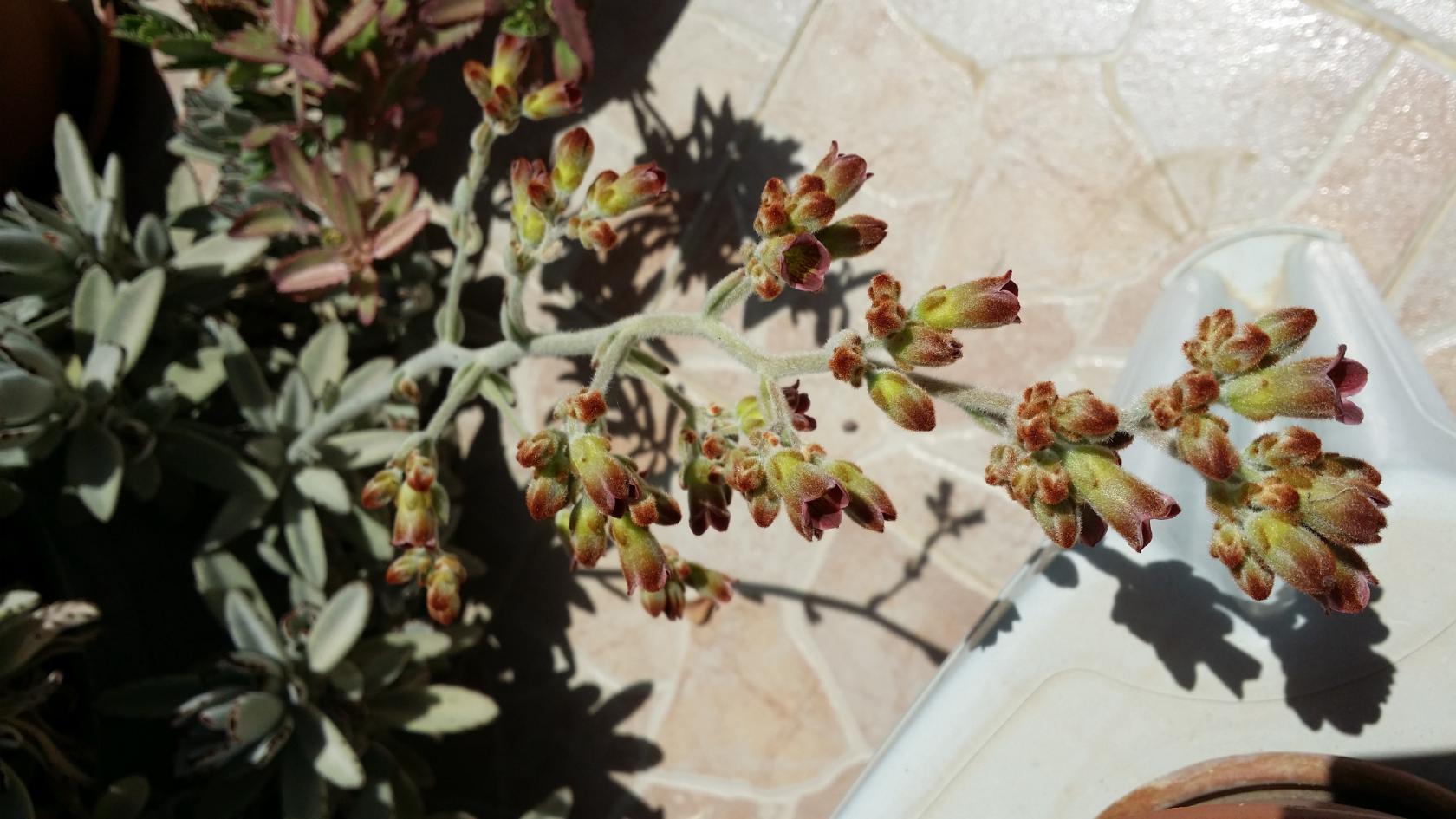
New photos from the past week:
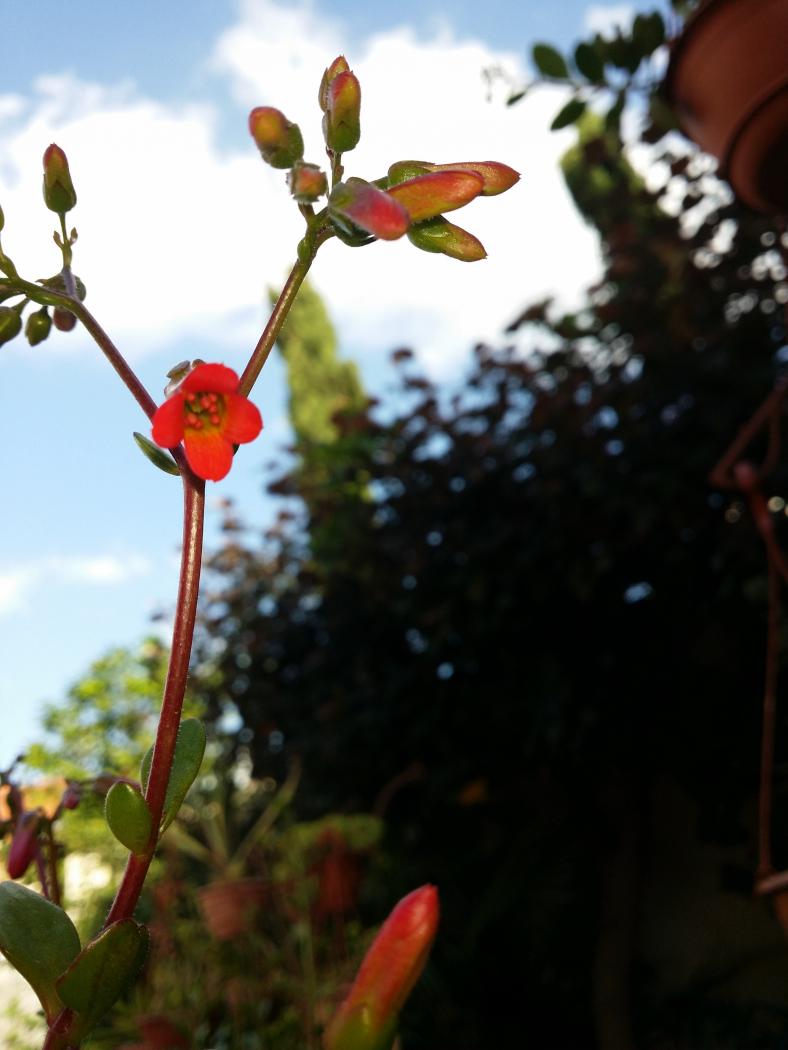
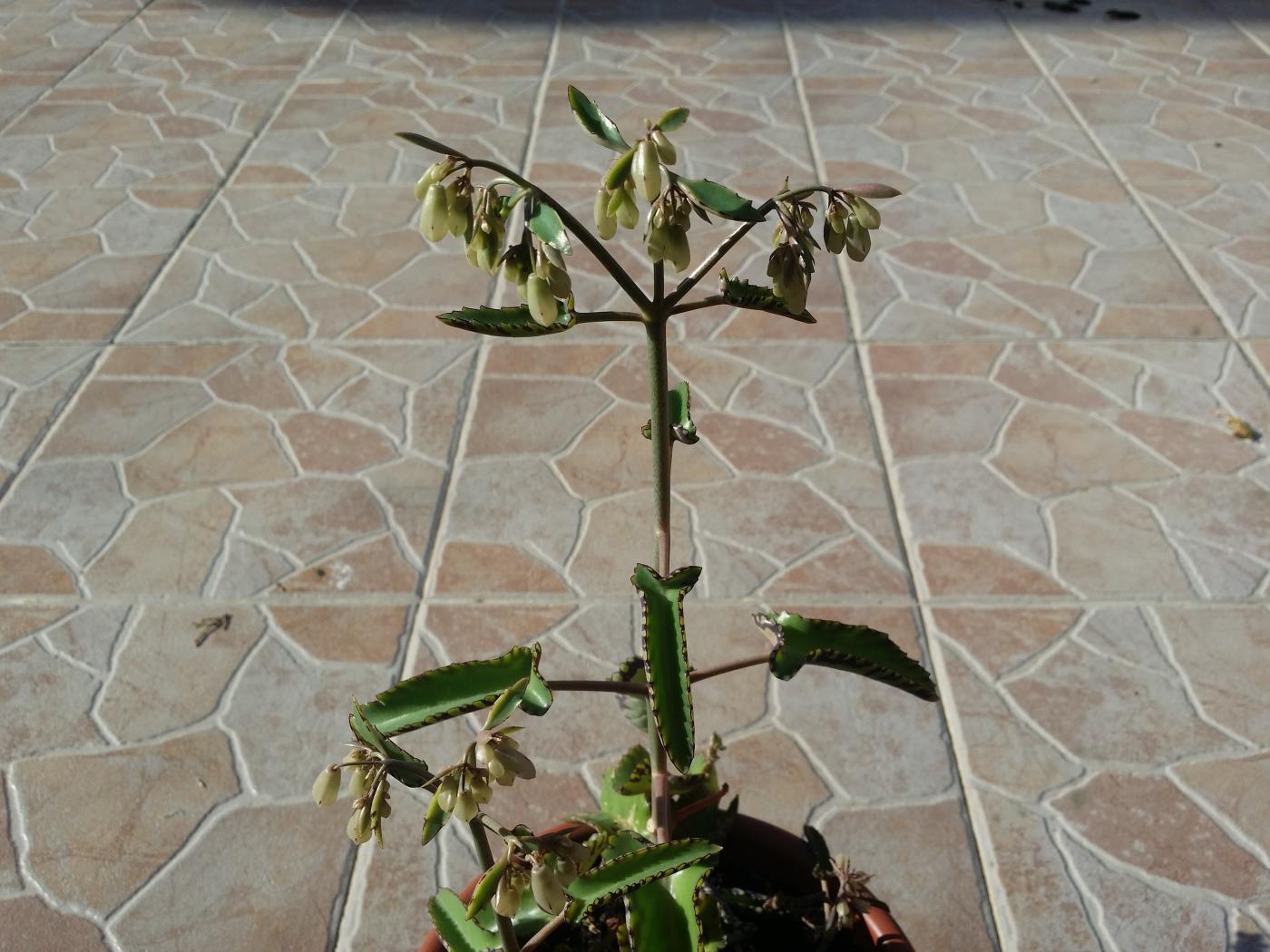
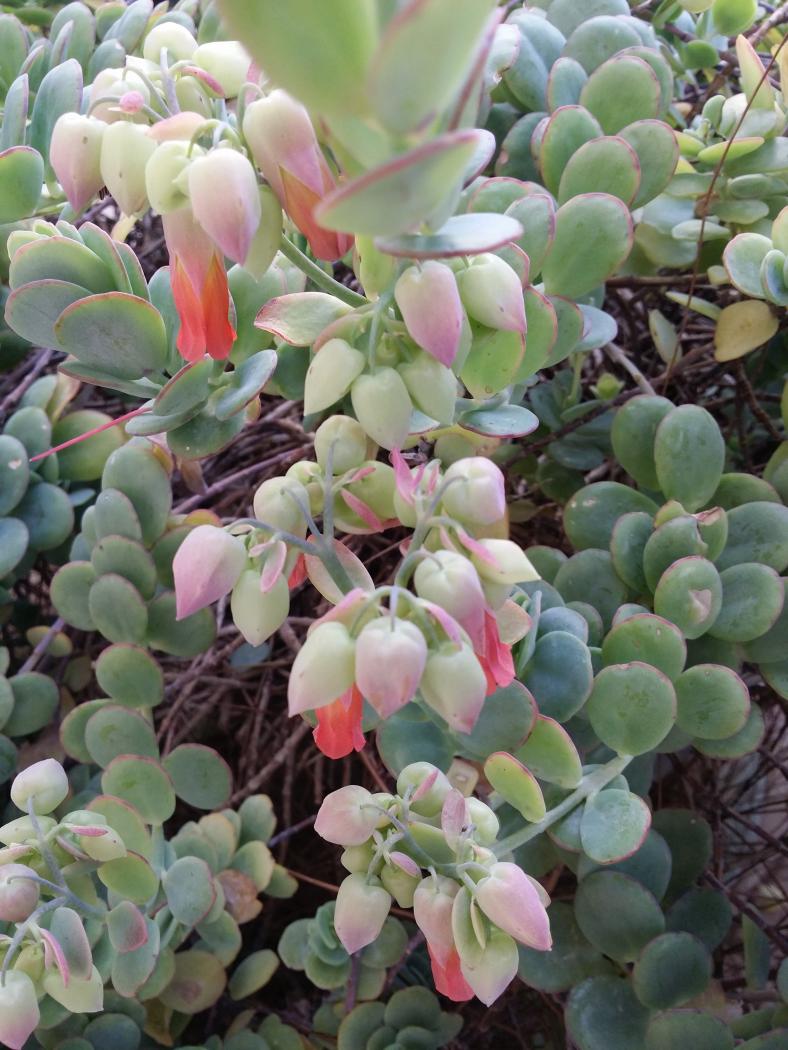
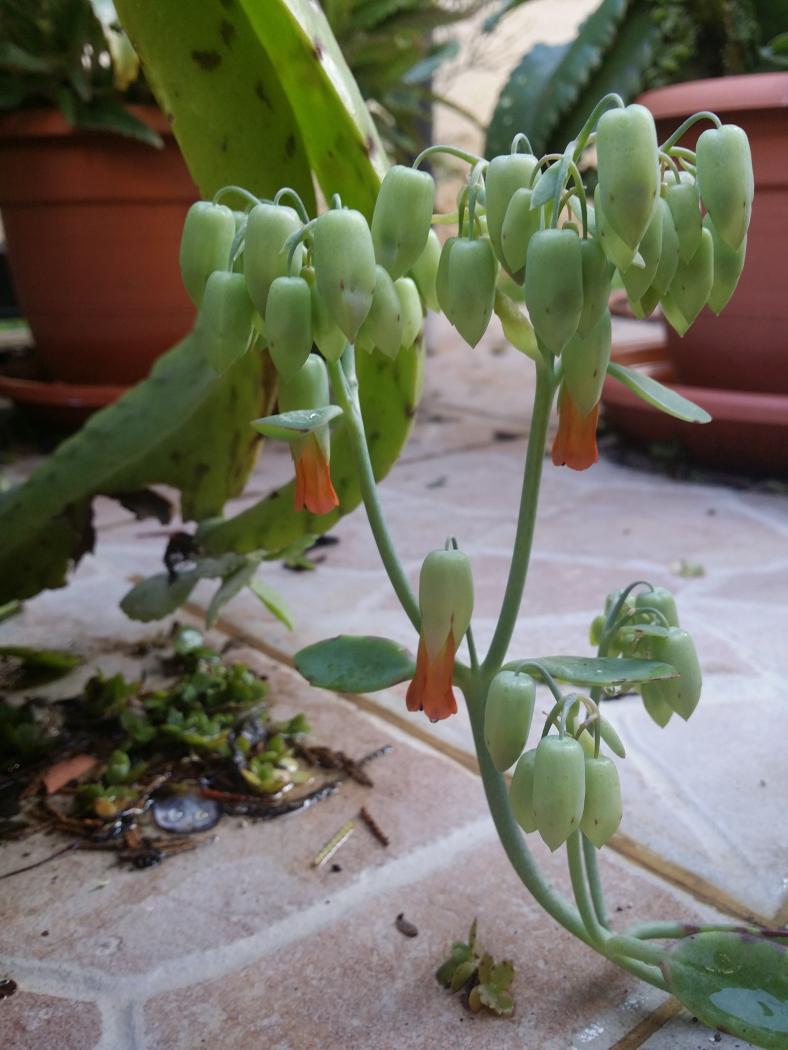
A tiny K. obtusa developing buds: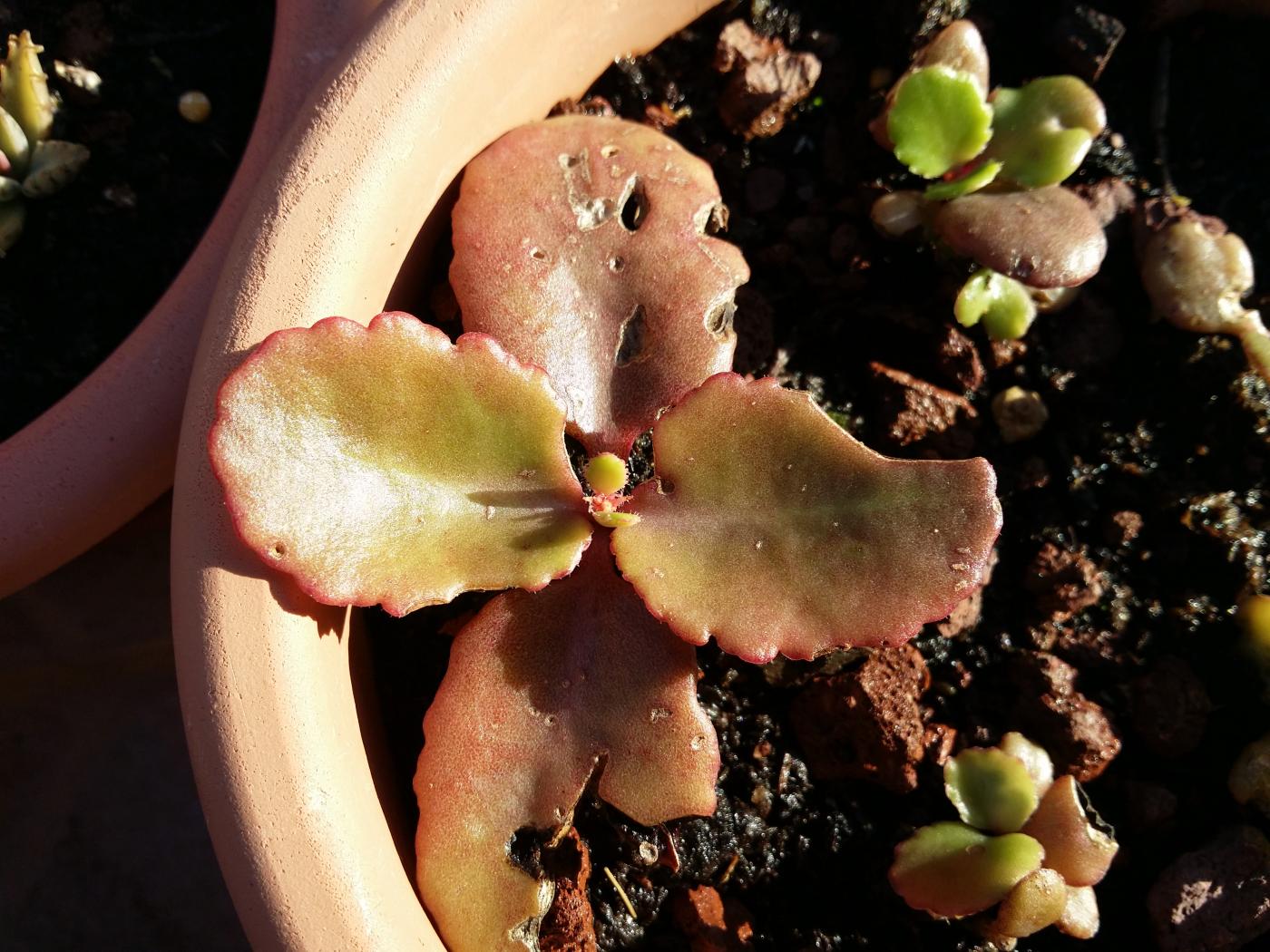
Offline
#55 2014-12-20 20:45:34
- margrit
- Administrator
- Registered: 2007-09-03
- Posts: 5,388
Re: Kalanchoe and others in my collection
Flowering season in Israel ! Thank you, Ronen.
Offline
#56 2014-12-21 15:01:34
- Ronen
- Member
- Registered: 2014-03-25
- Posts: 49
Re: Kalanchoe and others in my collection
Thanks Margrit!
Here are the first flowers to open of K. sexangularis and hairless K. synsepala:
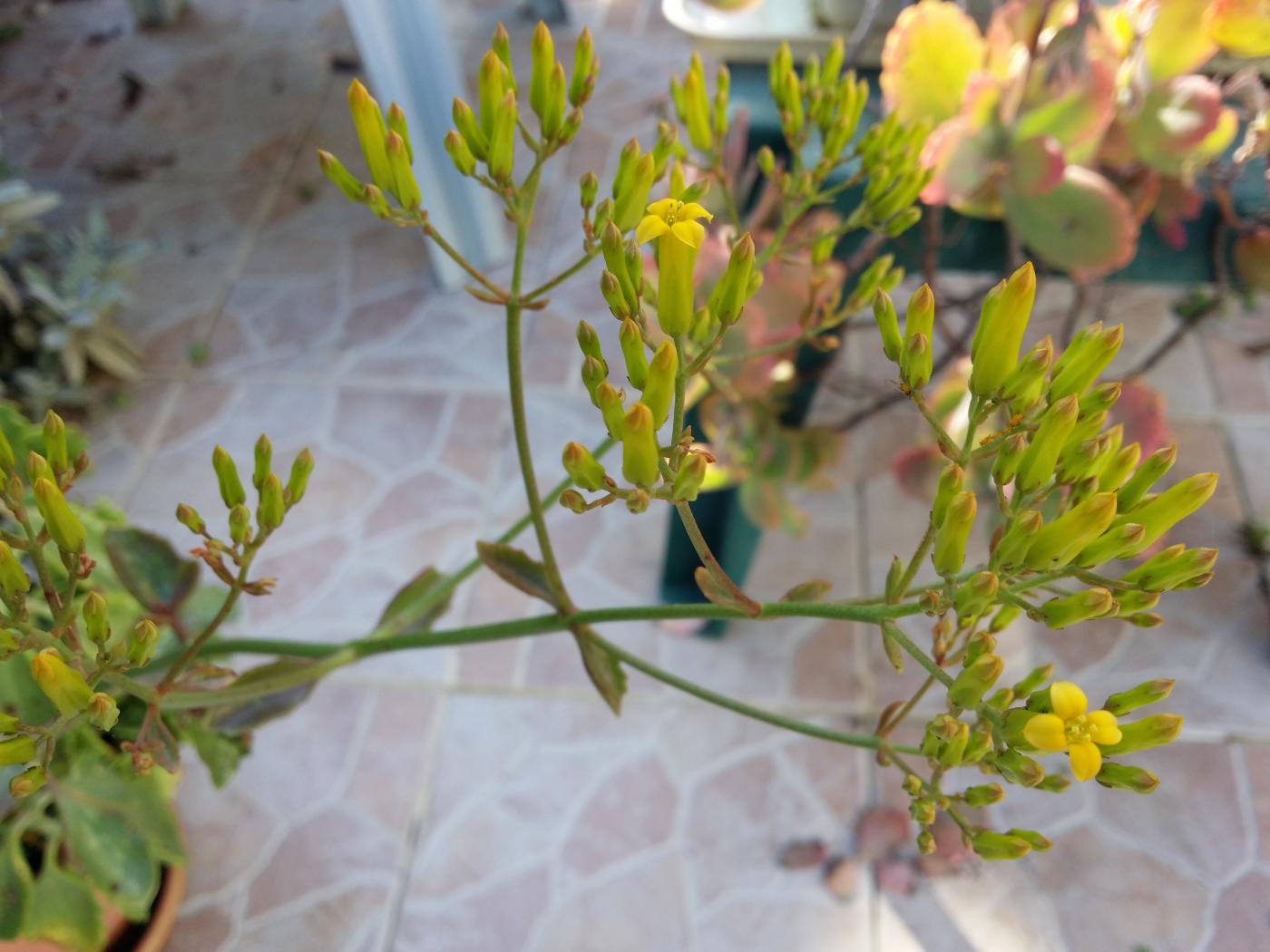
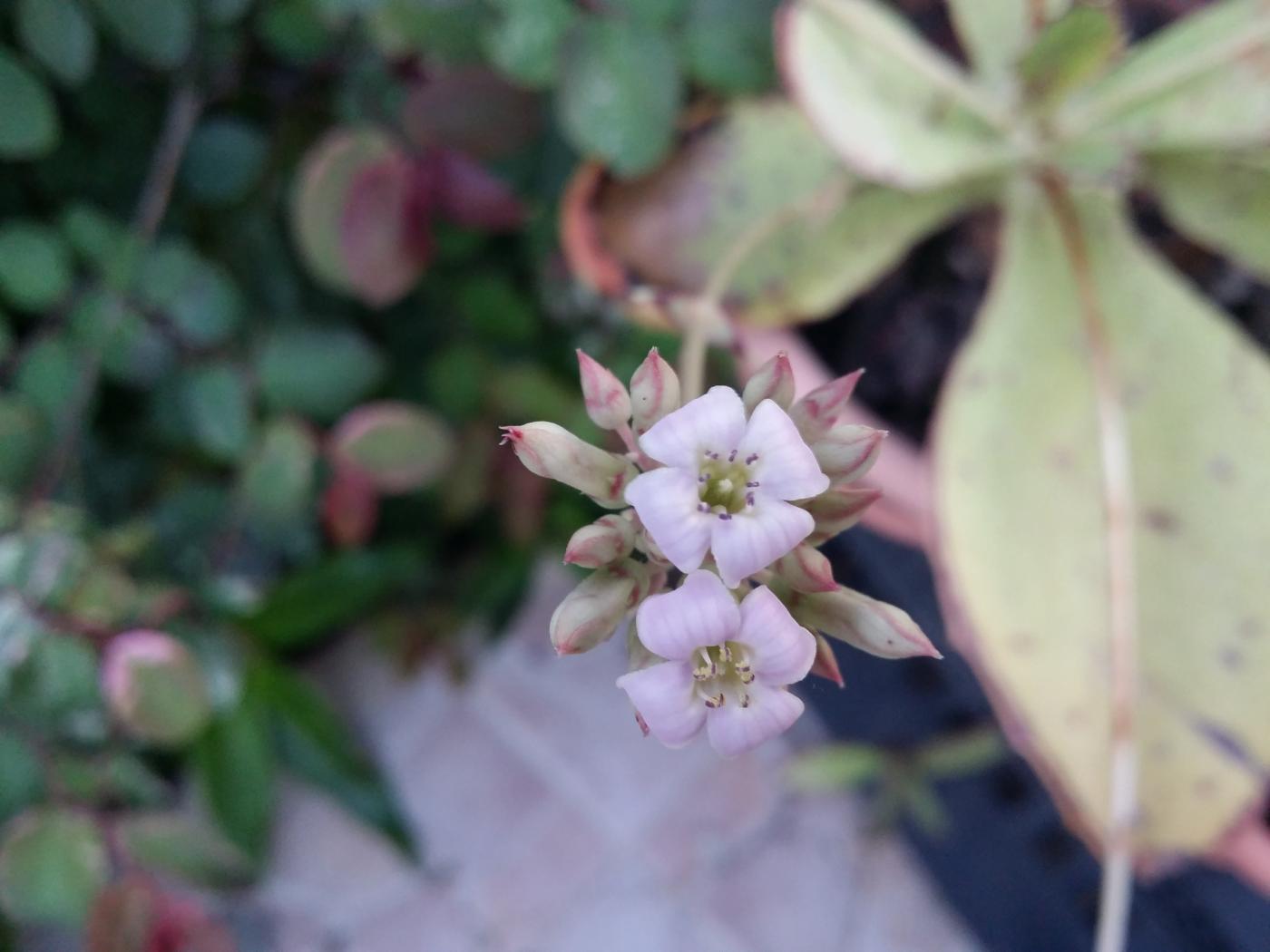
And two additional tomentosa that I suspect might differ from the other five:
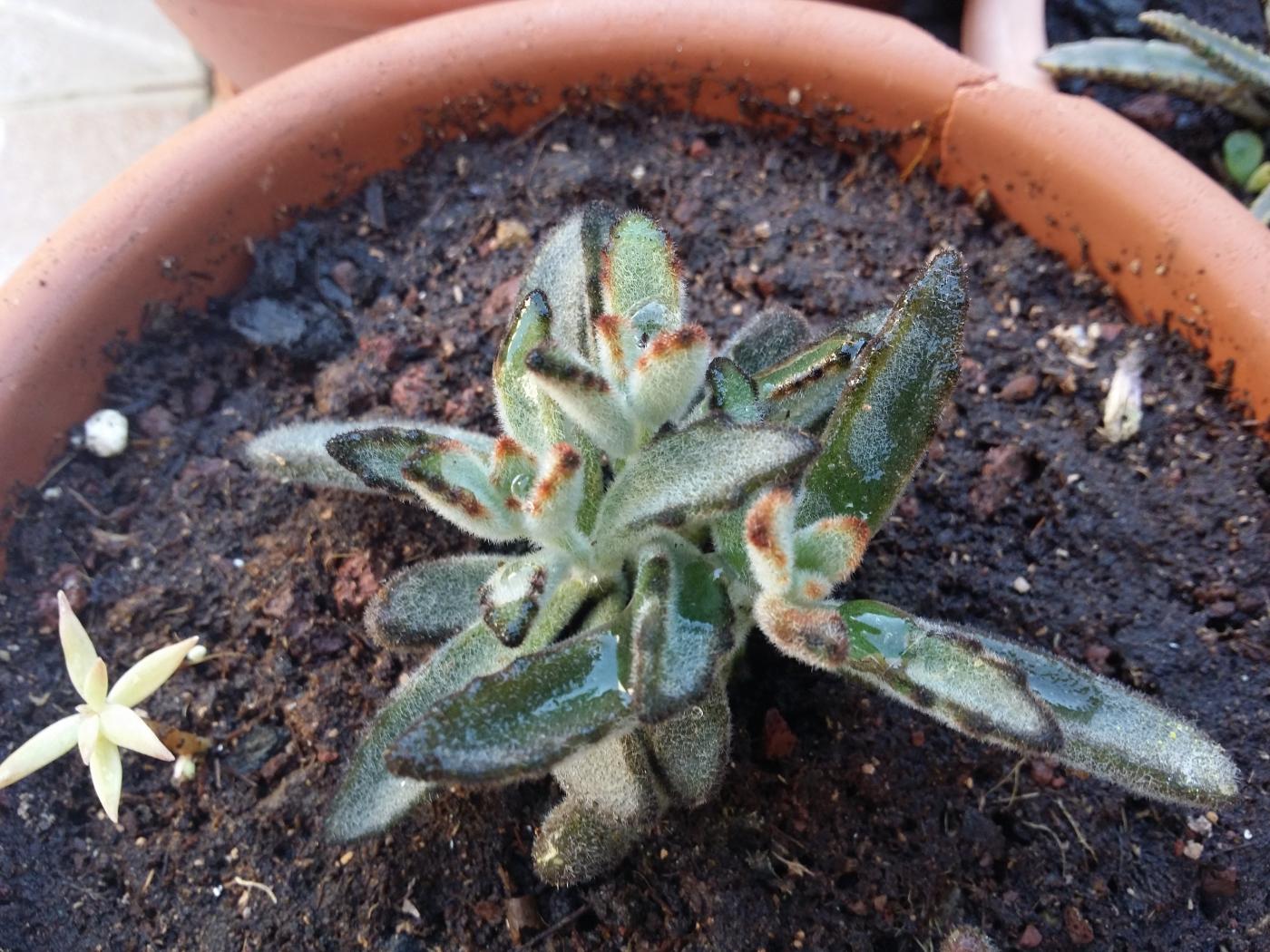
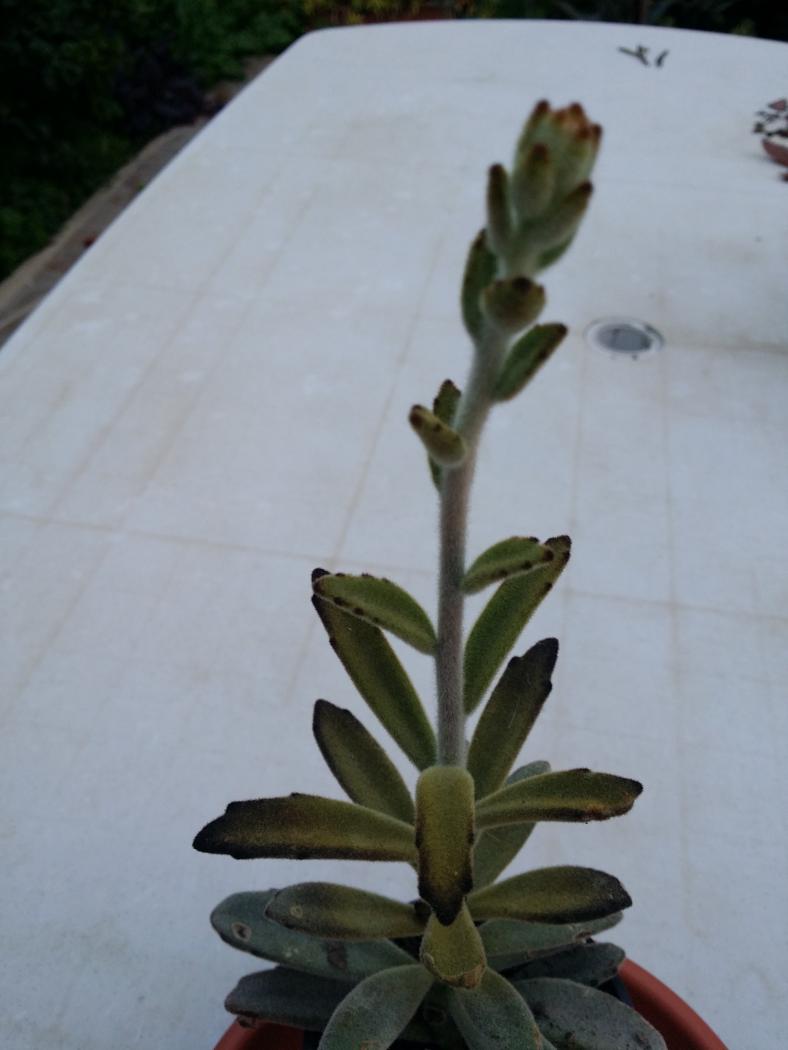
And a mystery,
Two weeks ago I found behind a bush in my garden a large Kalanchoe - the inflorescence was sticking out. It must have been there since the renovations a few years back, or maybe from seeds. I potted it and now it looks much better. Originally I thought it's a K. luciae, but the inflorescence had only one stage suggesting thyrsiflora, and now as the flowers are closer to opening - the petals are clearly yellow (suggesting thyrsiflora). The problem is that I don't remember ever having this species, instead I'm pretty sure that two years ago I saw the flowers of K. luciae in my garden (whitish petals, several stages) and I still have cuttings from this plant... Is there a way to confirm my memory that I have K. luciae, too, even if it hasn't flowered since??? See the photos below:
What I thought was my only plant of the two species, and based on memory alone, it is K. luciae?:
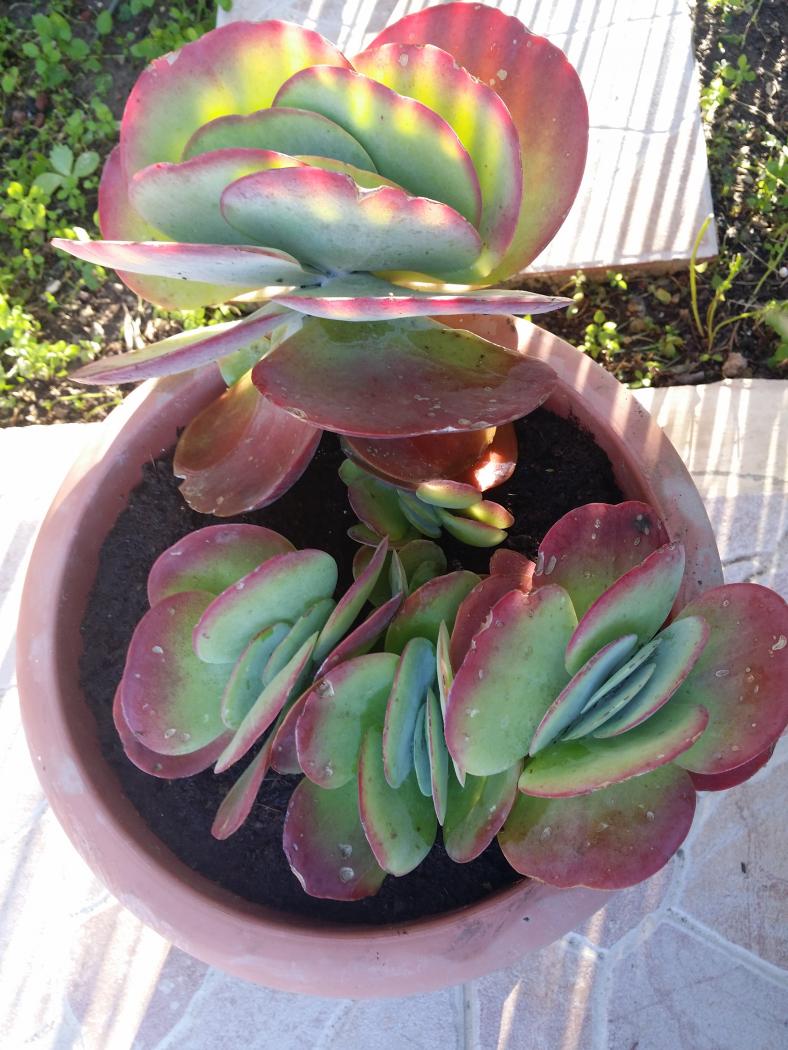
The rediscovered plant, apparently K. thyrsiflora:
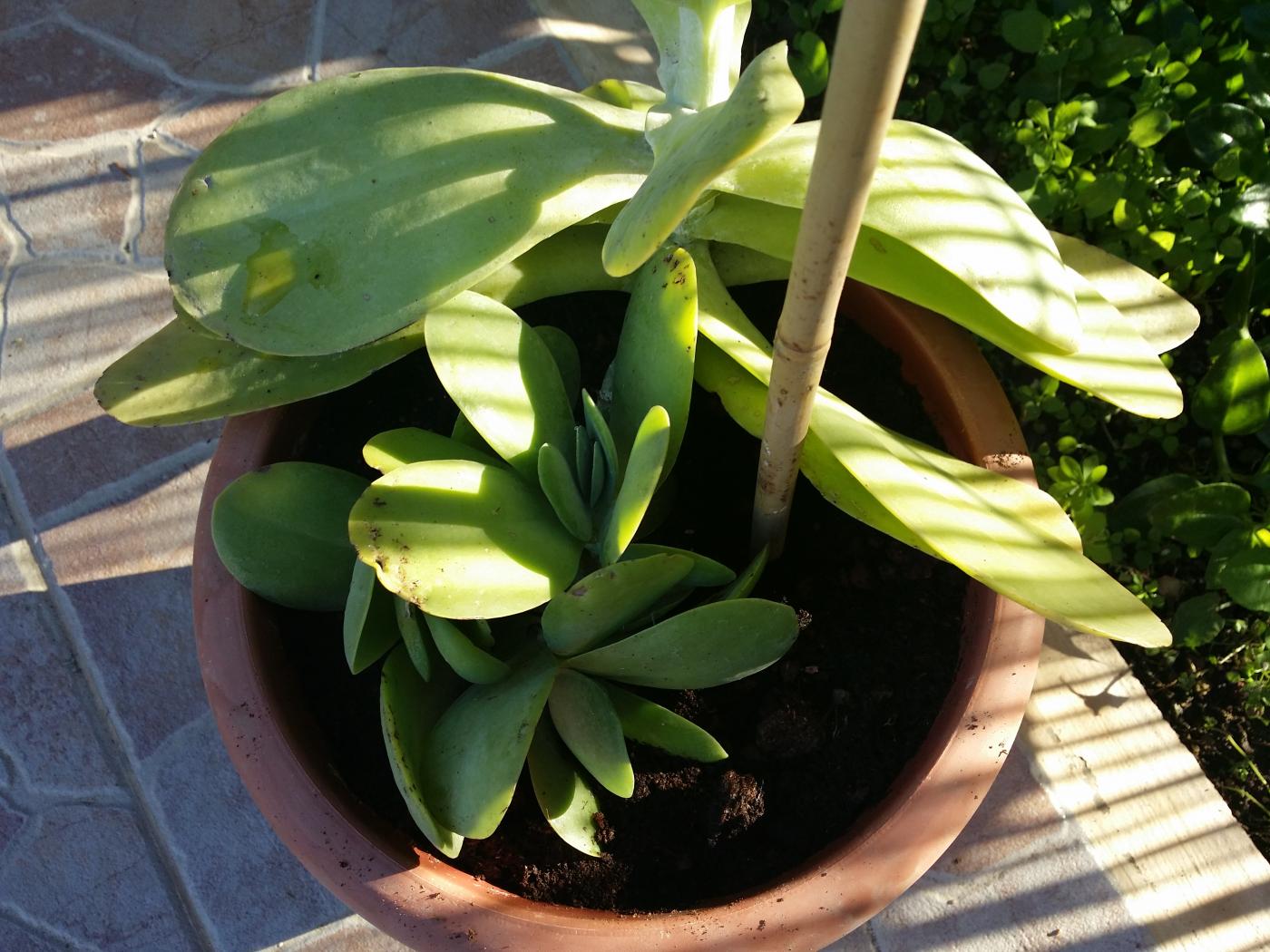
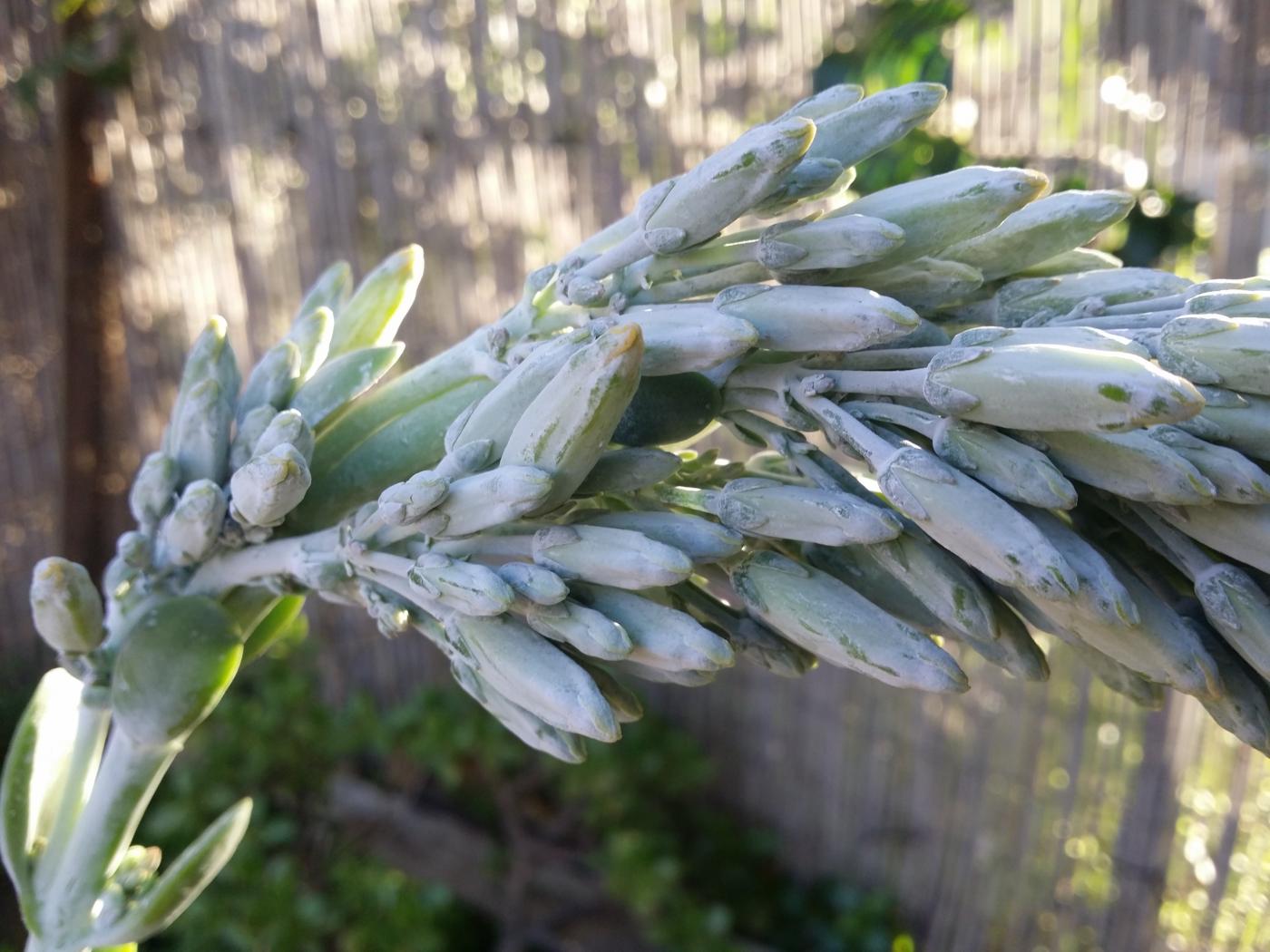
Offline
#57 2014-12-22 14:06:56
- margrit
- Administrator
- Registered: 2007-09-03
- Posts: 5,388
Re: Kalanchoe and others in my collection
Look at this link - the supposed thyrsiflora is quite resembling Jacquie's photos :
http://www.crassulaceae.ch/de/artikel?a … T&aID=2878
Whether the one you think is lucia is indeed this species - best to await the flowers, to be sure !
Offline
#58 2014-12-22 15:15:07
- Ronen
- Member
- Registered: 2014-03-25
- Posts: 49
Re: Kalanchoe and others in my collection
Look at this link - the supposed thyrsiflora is quite resembling Jacquie's photos :
Thanks, that's what I thought too! I started trying to smell the flowers this year, and before these buds only the open flowers of synsepala had any smell whatsoever (somewhat citrus like, but very weak). However, even the buds of this K. thyrsiflora are very fragrant - they remind me of the scent of jasmine! Can't wait to smell the open flowers!
Whether the one you think is luciae is indeed this species - best to await the flowers, to be sure !
Yes, but is there any other way?
Also, I've read in the description that some K. luciae are hairy. Does anyone have a clone like that, or a photo of such plant?
Offline
#59 2014-12-26 00:01:20
- margrit
- Administrator
- Registered: 2007-09-03
- Posts: 5,388
Re: Kalanchoe and others in my collection
It is the ssp. montana which is hairy, I have no idea whether it is in cultivation anywhere.
I admit that I rather think your other plant could be luciae, but I have read so often that the two species are so much variable vegetatively that they can only be distinguished with certainty when the flowers are present - I prefer not to run a risk !
Offline
#60 2014-12-26 11:34:57
- Ronen
- Member
- Registered: 2014-03-25
- Posts: 49
Re: Kalanchoe and others in my collection
It is the ssp. montana which is hairy, I have no idea whether it is in cultivation anywhere.
I admit that I rather think your other plant could be luciae, but I have read so often that the two species are so much variable vegetatively that they can only be distinguished with certainty when the flowers are present - I prefer not to run a risk !
OK, thanks! I have to agree that it's too risky with the possible luciae...
Some new openings:
Yellow flowered 'Calendiva':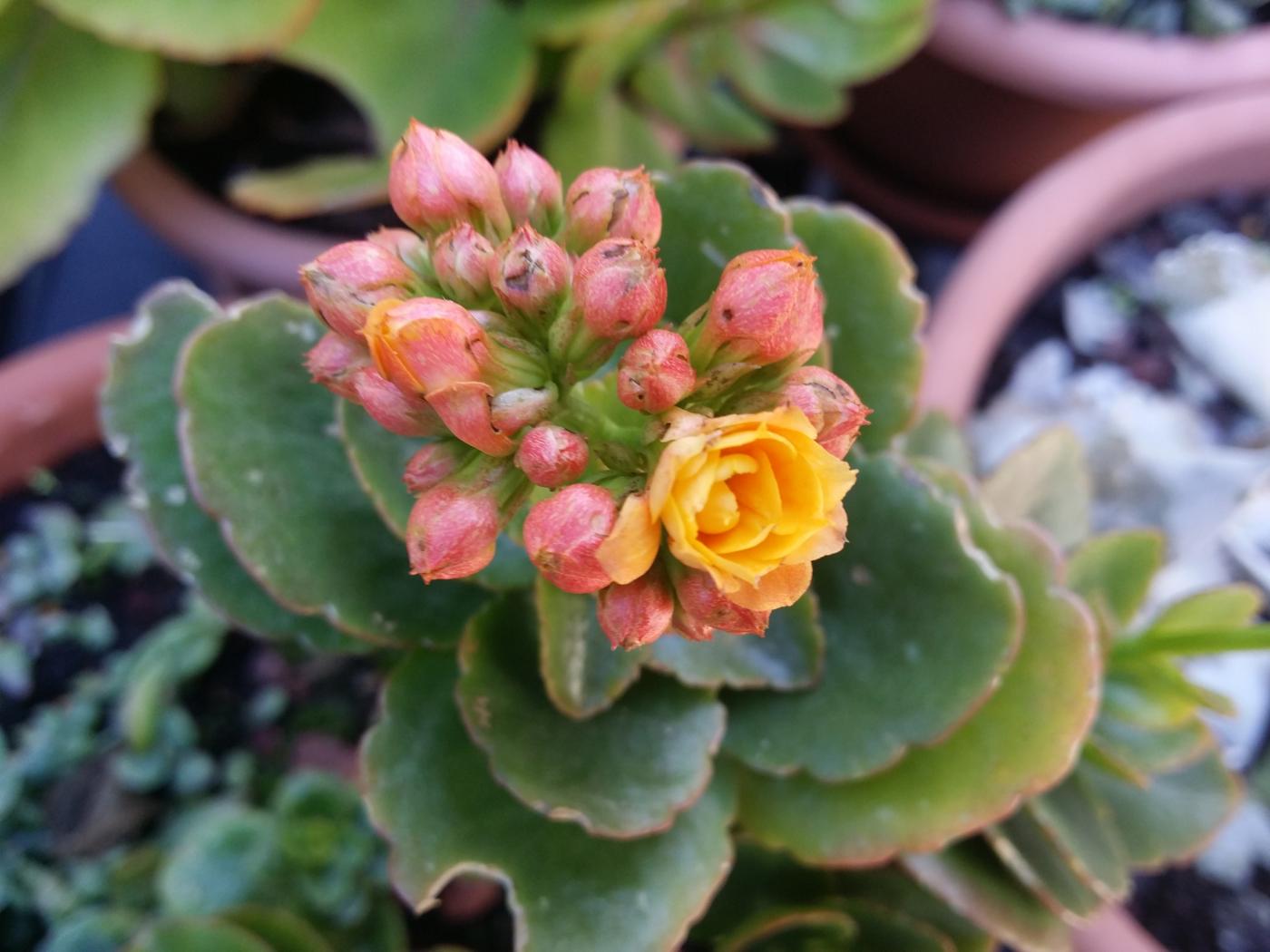
The very fragrant thyrsiflora: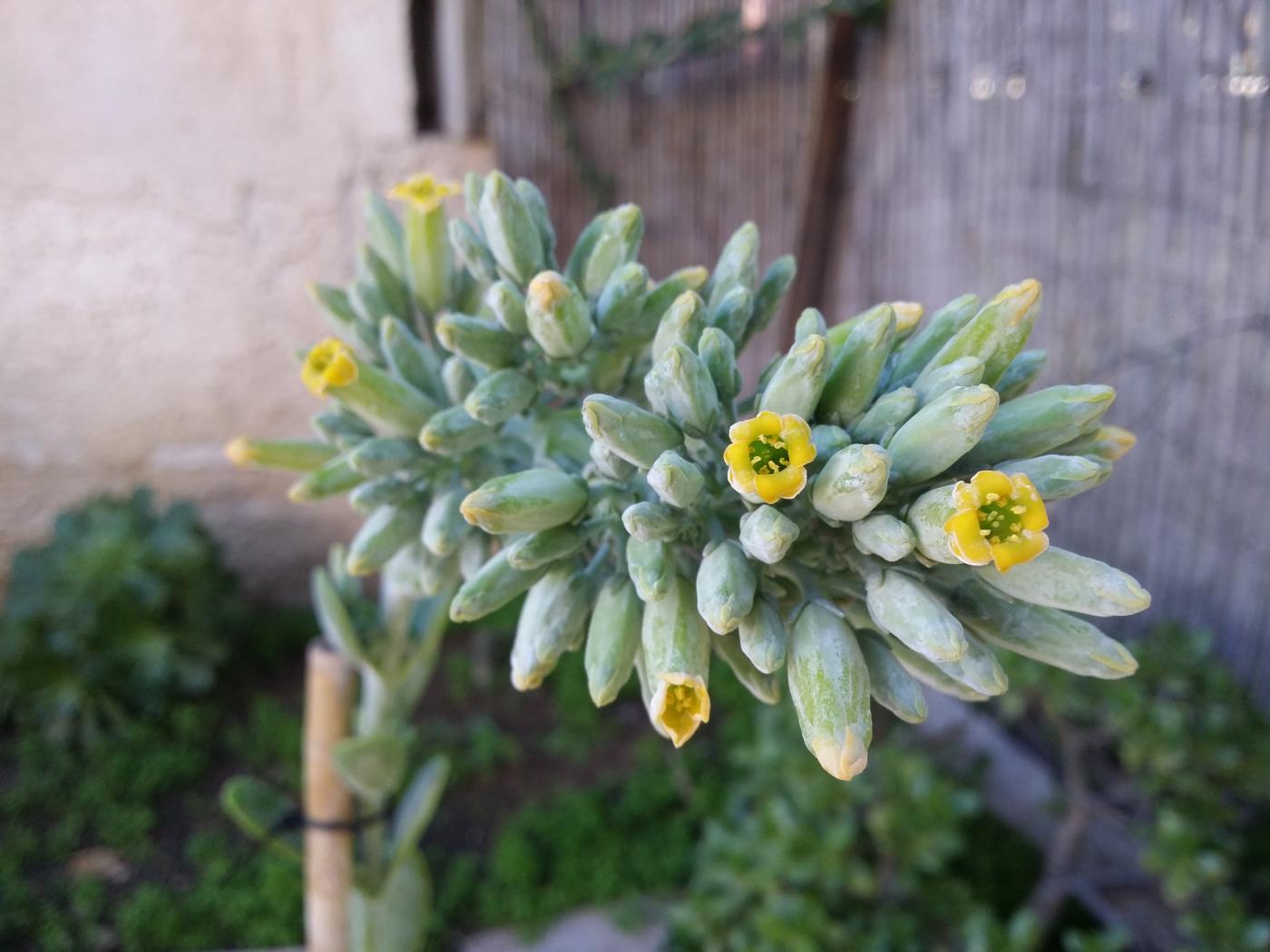
Richaud's K. sp from Pic Saint Louis: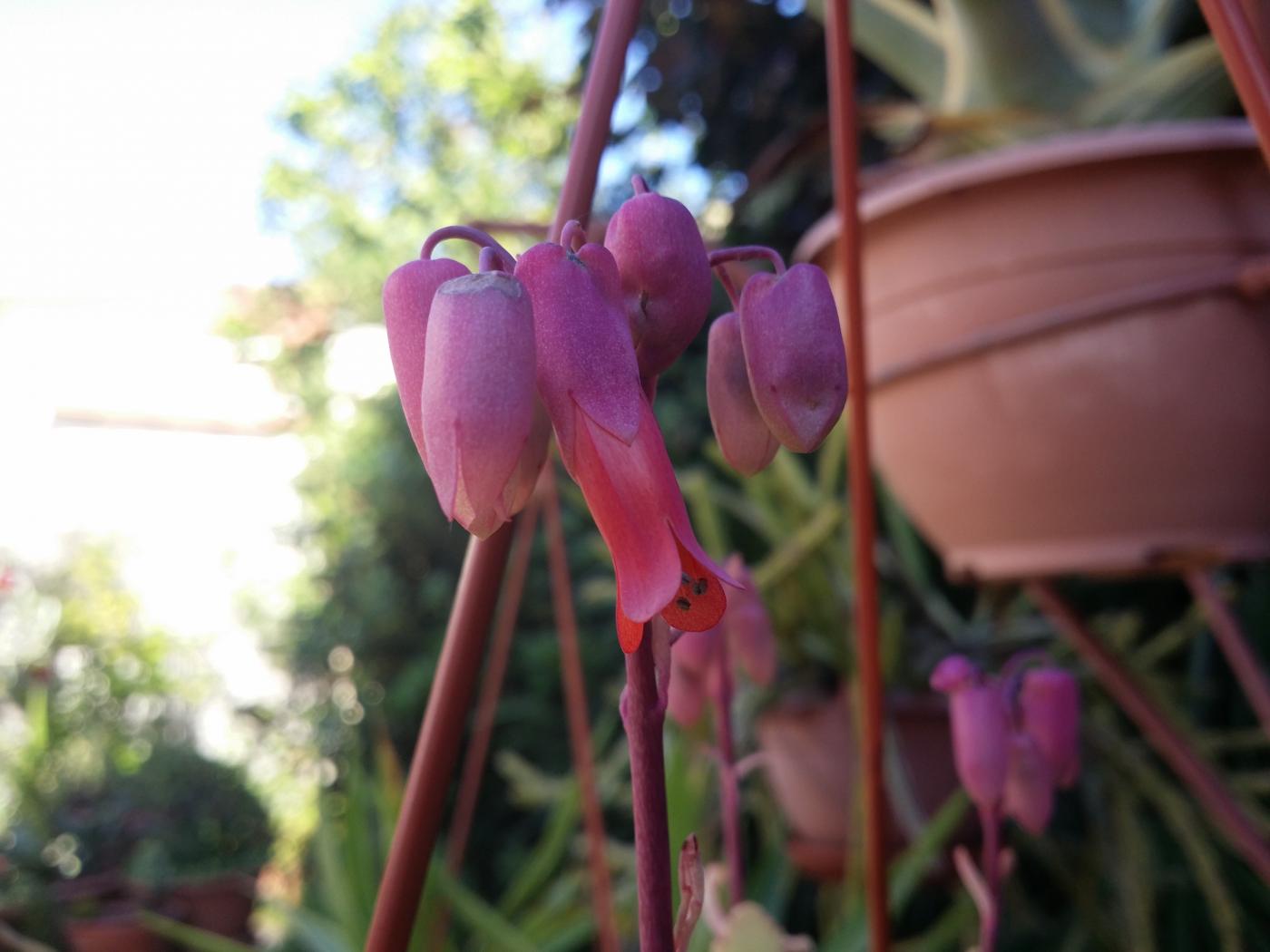
And I just had to show-off 'Tessa' again: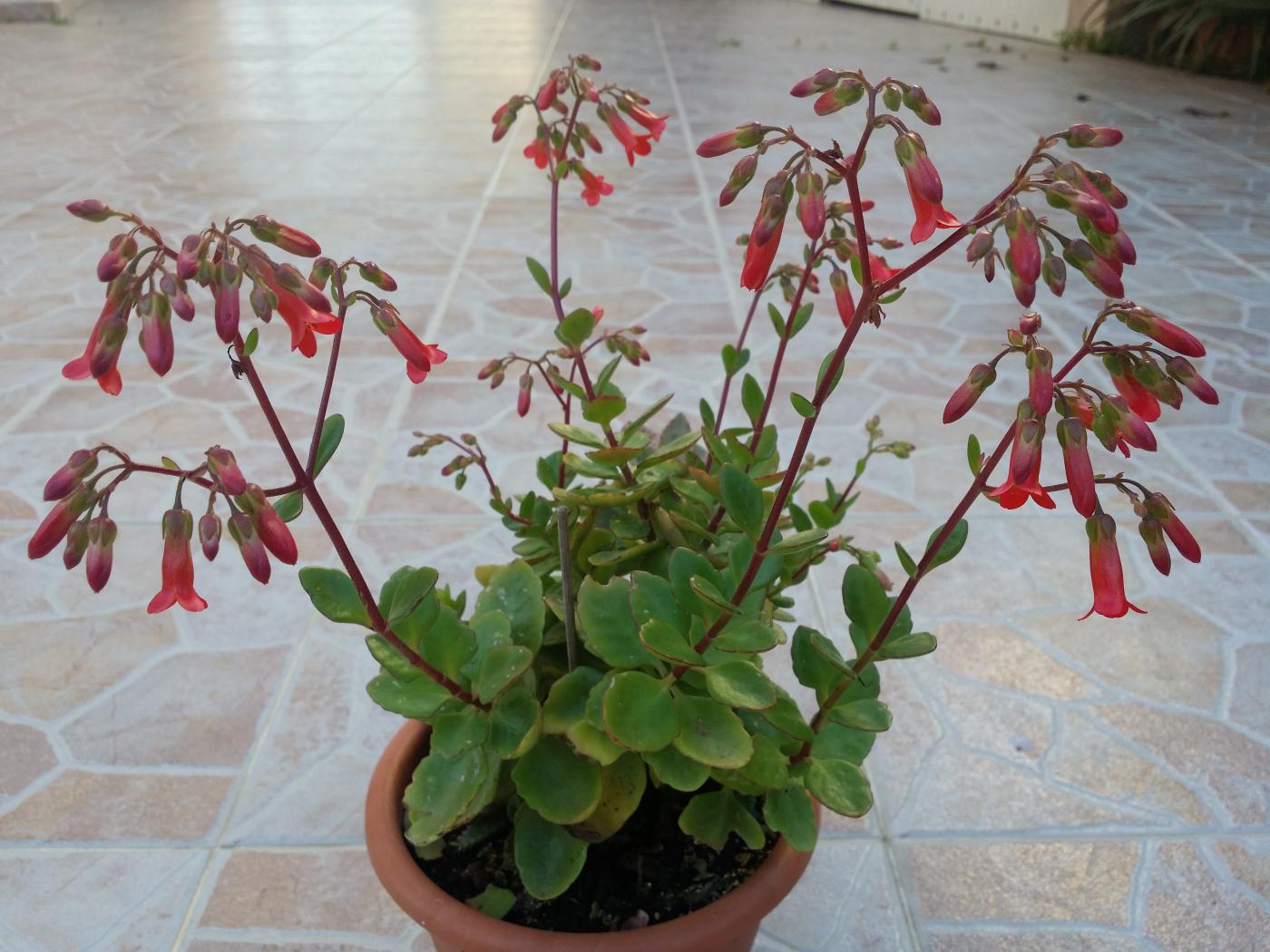
And another mystery plant, maybe K. glaucescens?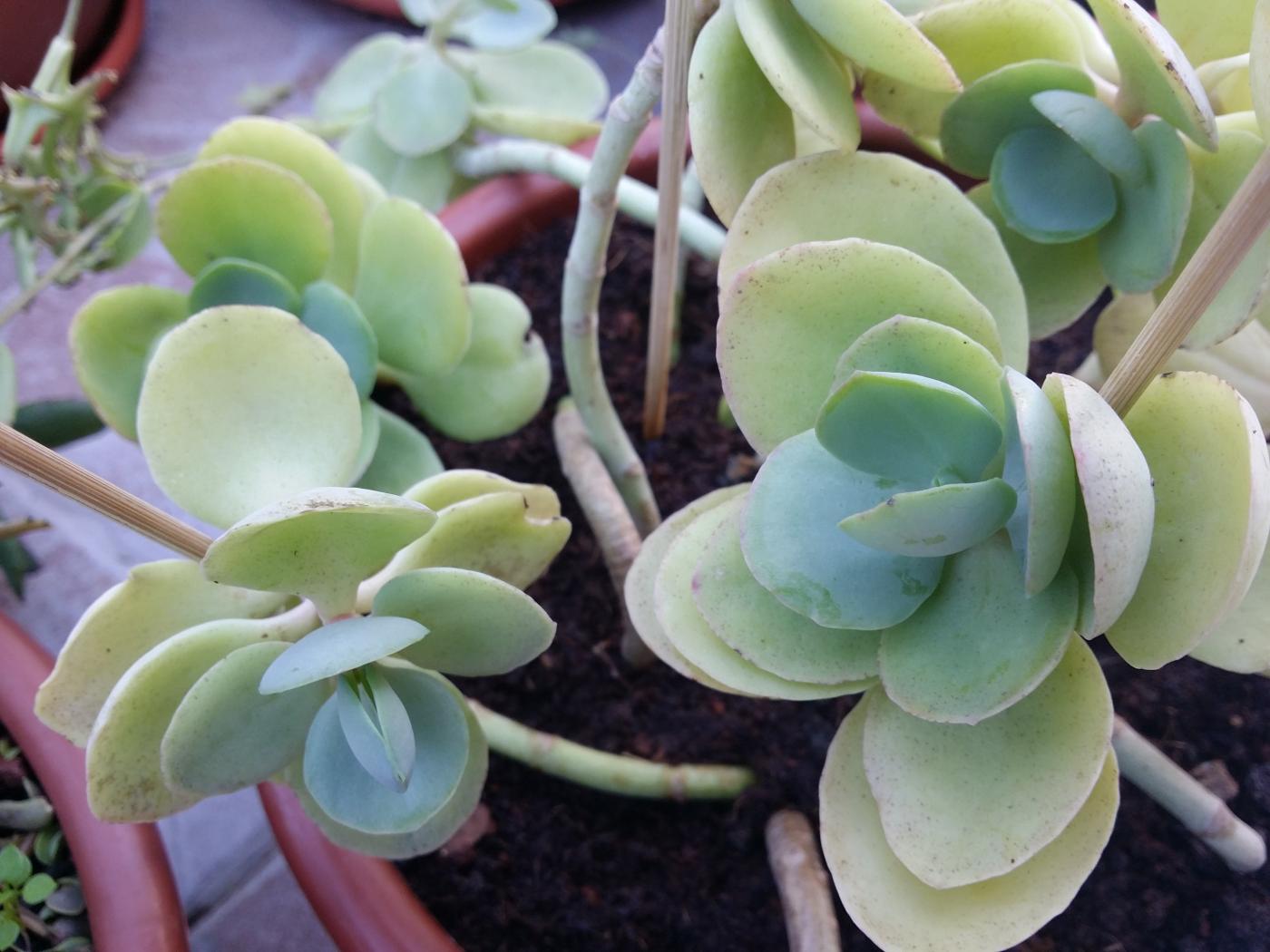
Offline
#61 2014-12-27 17:47:19
- margrit
- Administrator
- Registered: 2007-09-03
- Posts: 5,388
Re: Kalanchoe and others in my collection
Did you compare with the description ? Leaves of glaucescens to 10 x 7 cm ! ?
Offline
#62 2014-12-27 19:00:49
- Ronen
- Member
- Registered: 2014-03-25
- Posts: 49
Re: Kalanchoe and others in my collection
The description says:
Perennial, glabrous, pruinose, 0.3 - 1.2 m tall, stems erect or decumbent at the base. Leaves petiolate, petiole slightly flattened and grooved above, 0.5 - 2.5 cm, easily detachable from the stem, lamina narrowly to broadly ovate, obovate, glaucous or glaucescent, sometimes with maroon or purple spots beneath, to 10 x 7 cm, tip acute to obtuse, base cuneate, margins bluntly serrate to crenate, rarely subentire.
Everything seems to fit (even easily detachable leaves), apart from slightly grooved above petiole (but it is slightly flattened), and as you see the leaves are subentire. The leaves are 7 x 5 cm, but the description says "to", so is it close enough?
Offline
#63 2014-12-30 17:43:28
- margrit
- Administrator
- Registered: 2007-09-03
- Posts: 5,388
Re: Kalanchoe and others in my collection
Yes, it is. The leaves of your plant look much smaller ! !
Offline
#64 2015-01-03 09:23:48
- Ronen
- Member
- Registered: 2014-03-25
- Posts: 49
Re: Kalanchoe and others in my collection
It is the "up to" size - younger leaves are smaller. I have another form of glaucescens, but the only thing that makes me question the ID is the size of its leaves, up to 3.5 x 1.5 cm. I'll wait for it to look more characteristic before posting photos (it had trouble adjusting to my conditions), but it's very different from this form. And there is the unidentified species from earlier posts - looks somewhat like a possible glaucescens, but too big and erect.
Some additional forms are with open flowers - I already took the photos but will post later...
For now, a comparison between two clones of prittwitzii (which resembles glaucescens in many traits), one from Yale Sedman who received it from Kenya, the other received as "K. lugardii" from Richaud and collected by Descoings. "K. lugardii" is the one with entire leaves.
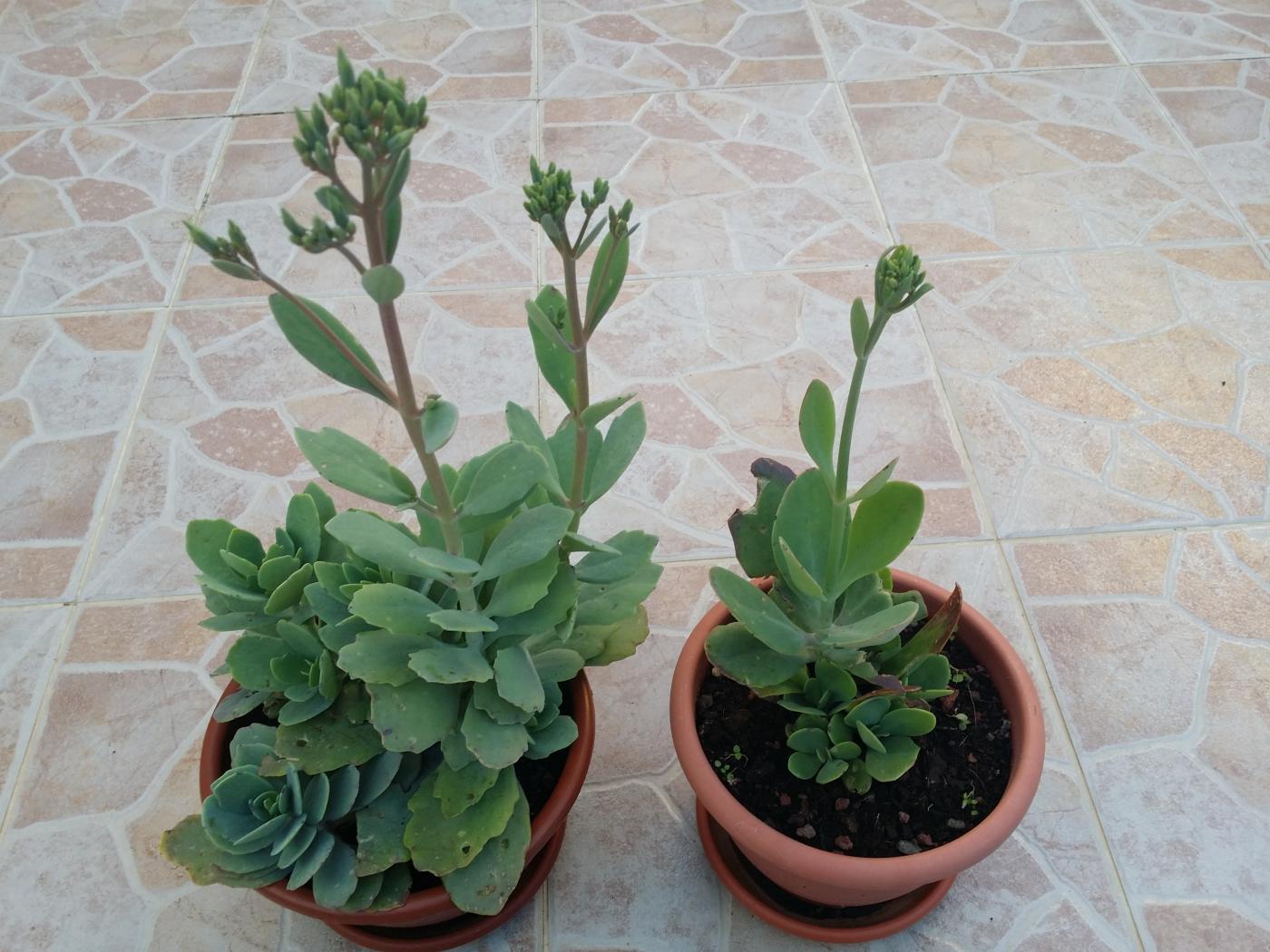
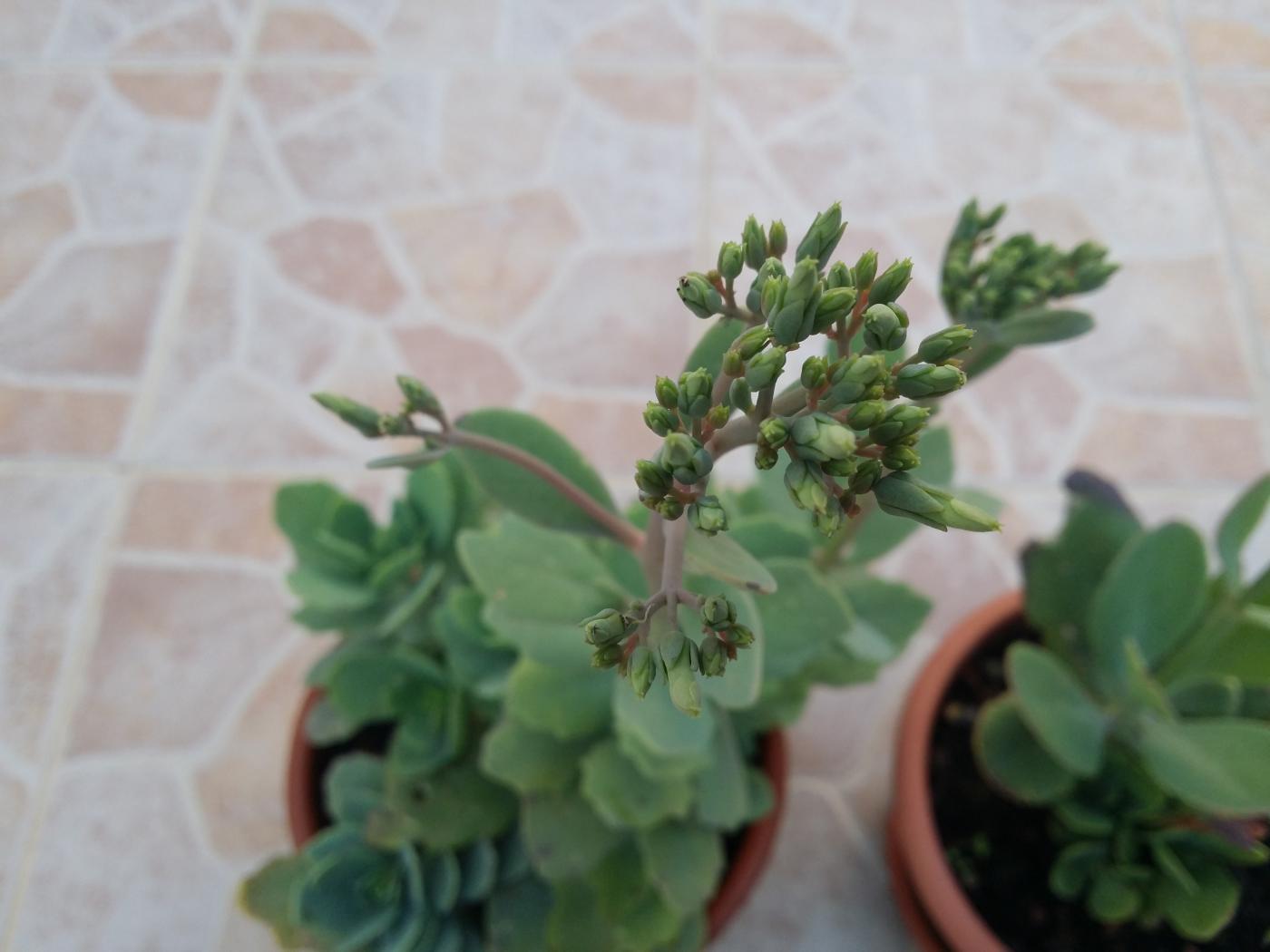
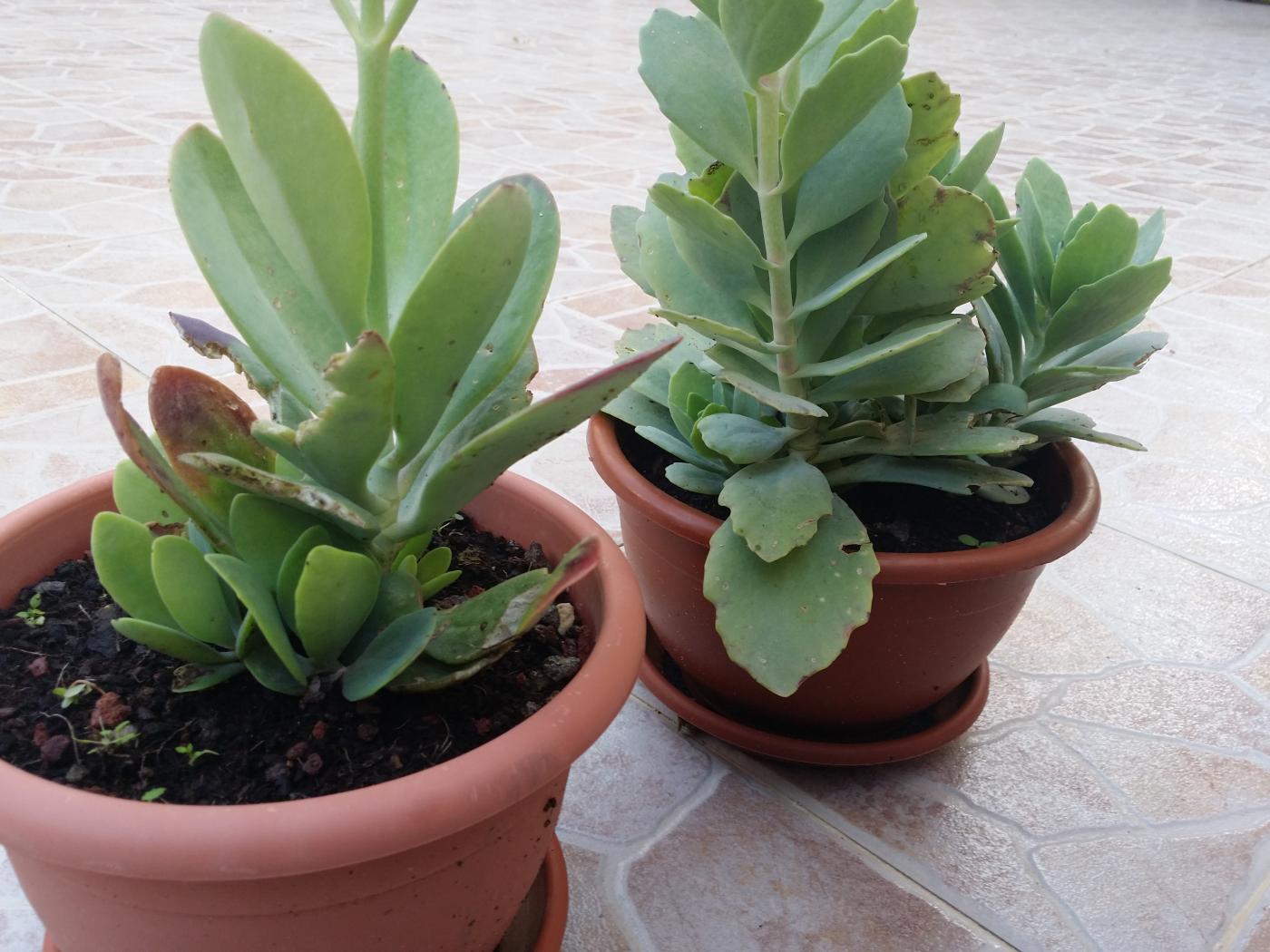
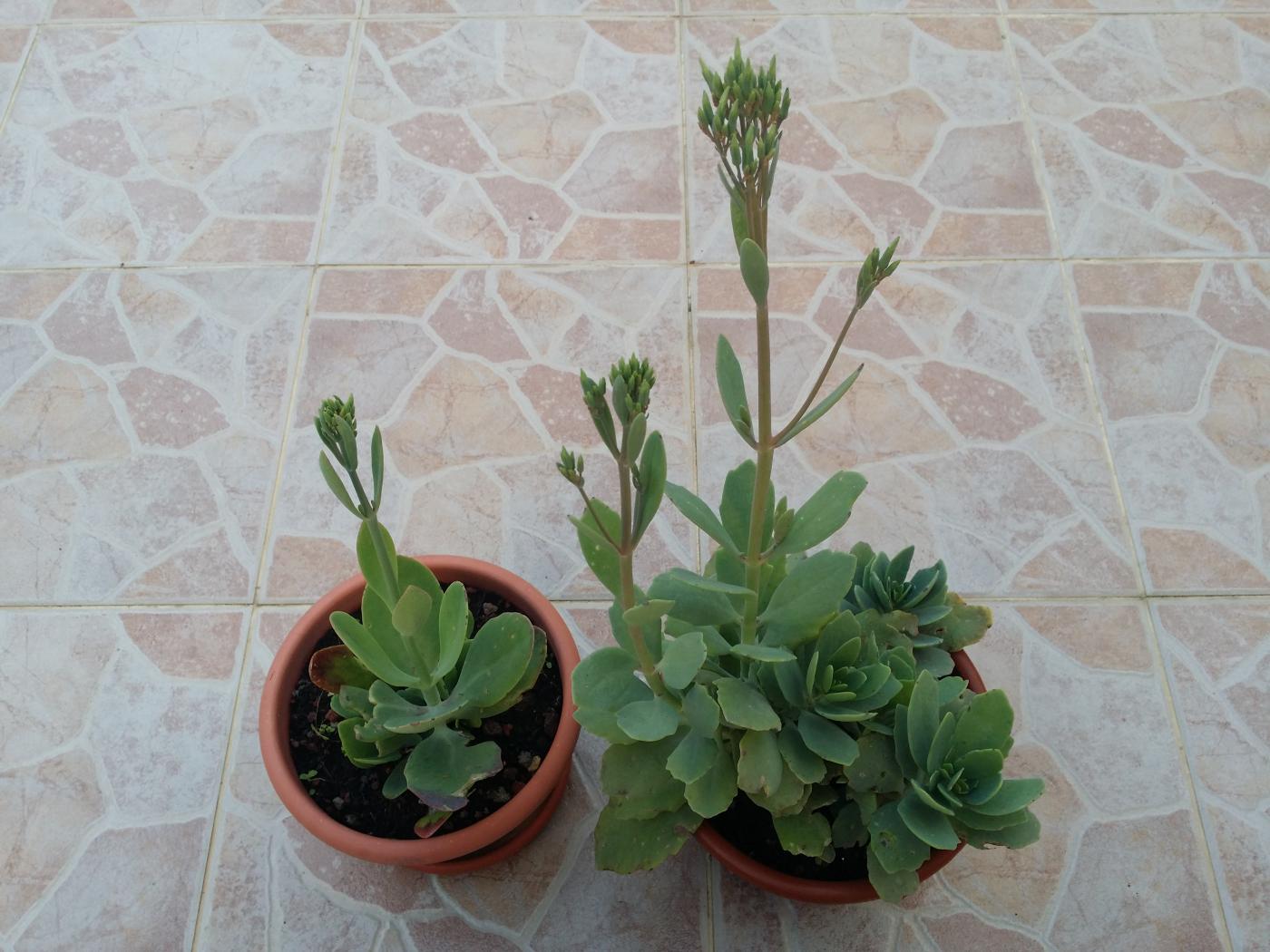
Offline
#65 2015-01-03 20:27:48
- margrit
- Administrator
- Registered: 2007-09-03
- Posts: 5,388
Re: Kalanchoe and others in my collection
Prittwitzii is one of those infuriatingly variable species - of course no wonder in view of its wide distribution. Looking forward to the flowers !
Offline
#66 2015-01-04 17:30:23
- Ronen
- Member
- Registered: 2014-03-25
- Posts: 49
Re: Kalanchoe and others in my collection
Yes, but it seems that the variation in prittwitzii (at least the forms I'm aware of) mirrors variations in other species like glaucescens, rotundifolia, etc. I mean that within a species, only certain traits like a small range in leaf margin types, corolla contrast and brightness, degree of hairiness, degree of glaucousness, etc, are variable - while other traits remain constant... It's like certain traits were chosen to be taxonomically relevant, while others aren't. I'm not even sure if it is not just the product of the subjectivity of the people who described these species and of their taxonomic history?
I'm also looking forward to seeing the flowers - especially of "K. lugardii" which I've never seen (not even in photos)... Hopefully the very rainy climate this year won't interrupt the process (we had more, rather small, hail, and another storm is coming. I'll move the plants for this one as it will probably be accompanied with large hail).
Offline
#67 2015-01-04 19:52:41
- margrit
- Administrator
- Registered: 2007-09-03
- Posts: 5,388
Re: Kalanchoe and others in my collection
Plants with such a wide distribution as the one in question or an even vaster distribution as K. rotundifolia can't help being very variable according to growing conditions, climate etc etc - far beyond the subjectivity of describers.
Offline
#68 2015-01-24 09:08:12
- Ronen
- Member
- Registered: 2014-03-25
- Posts: 49
Re: Kalanchoe and others in my collection
Three weeks passed since my last post, due to another very strong hail storm. I managed to mostly shield most of the pots but large pots (like clones of rosei and fedschenkoi) suffered some damage, especially to the inflorescences. The rest regenerated relatively well, so here are some new developments.
Buds on my regular clone of x 'Wendy' (miniata x porphyrocalyx), i.e. not double-flowered, from Japan: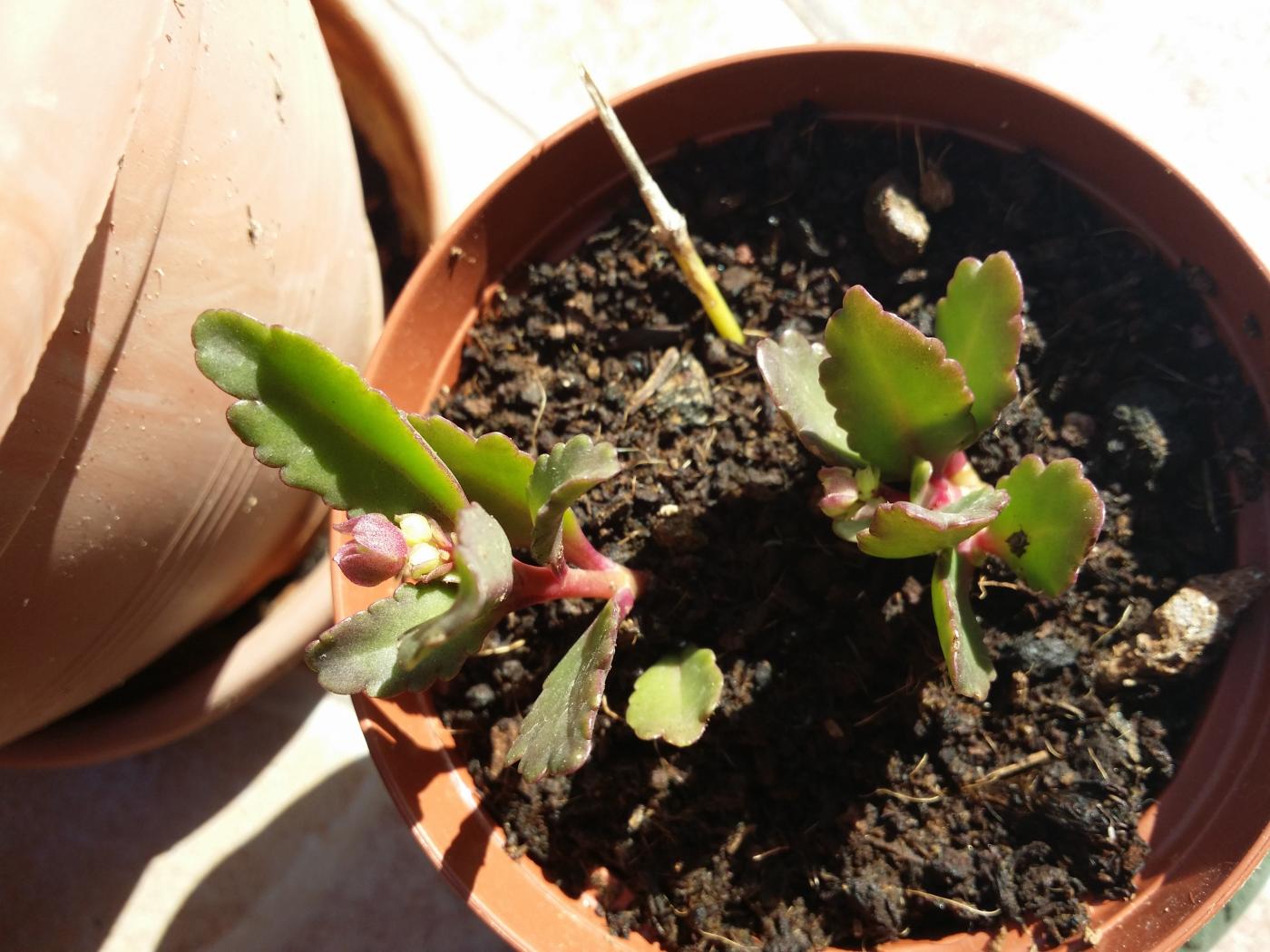
Buds on another plant that recently arrived from Japan, a possible uniflora x gracilipes: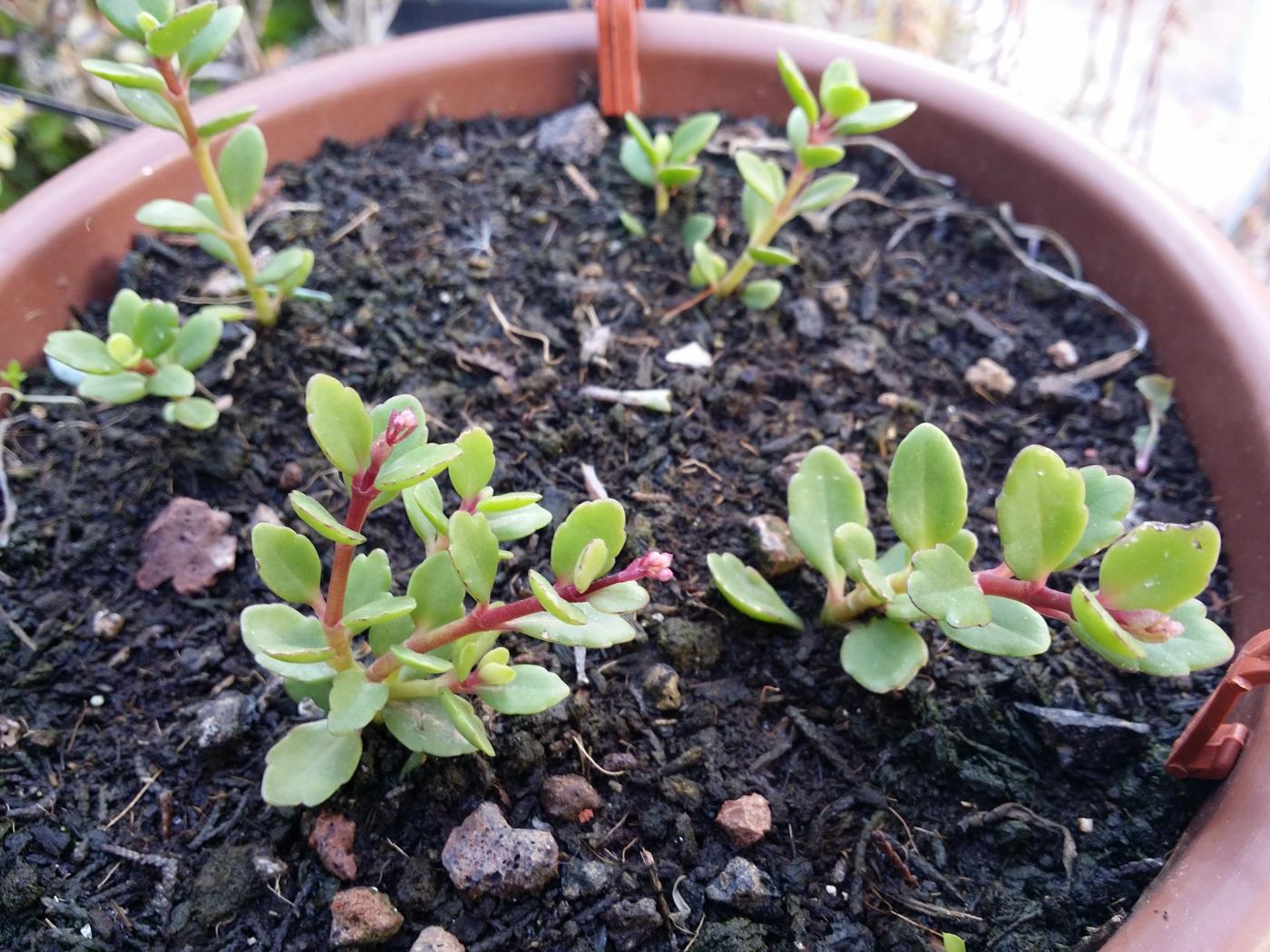
Newer photo of K. sp. Pic St Louis: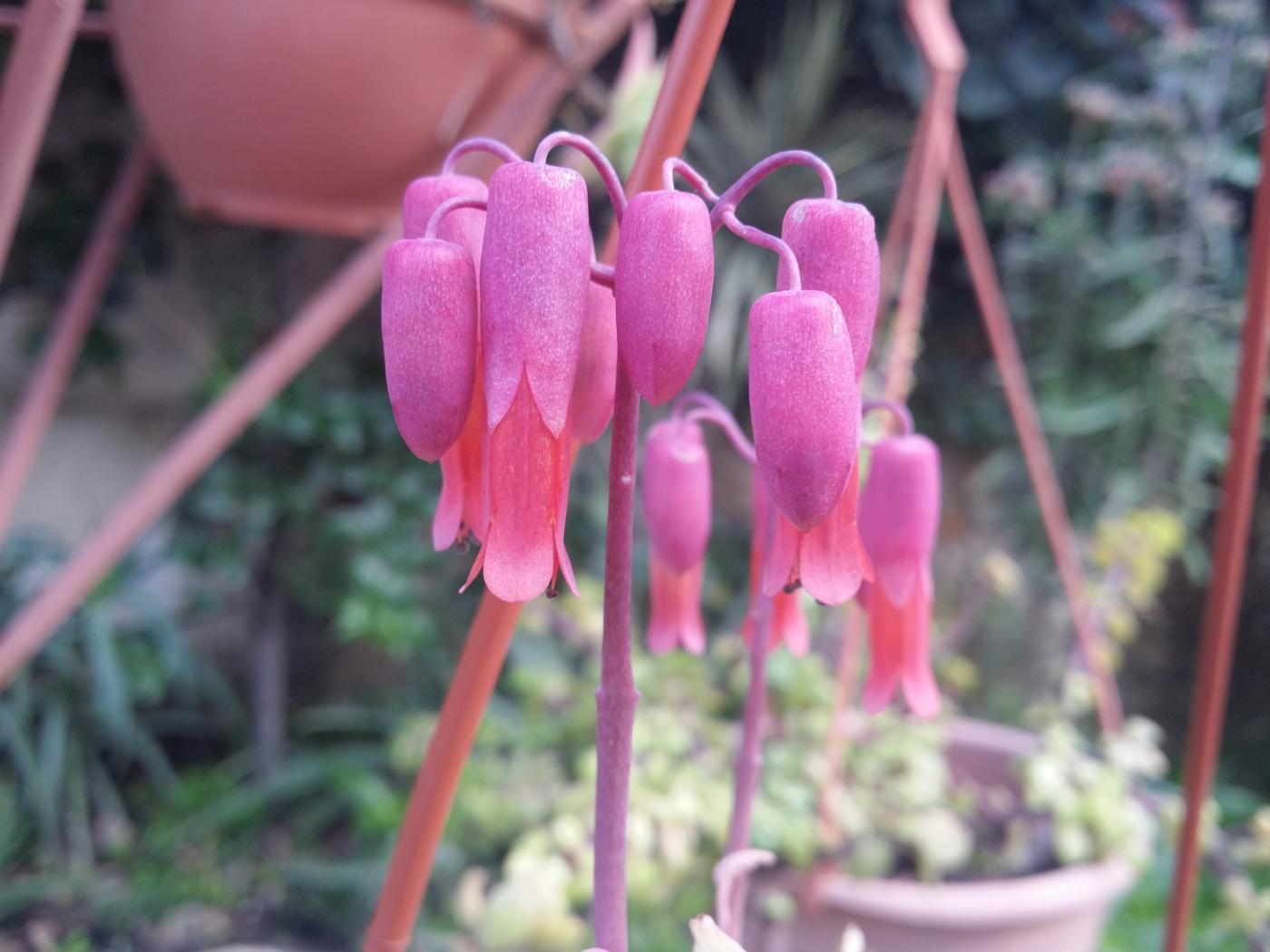
K. rebmannii in flower: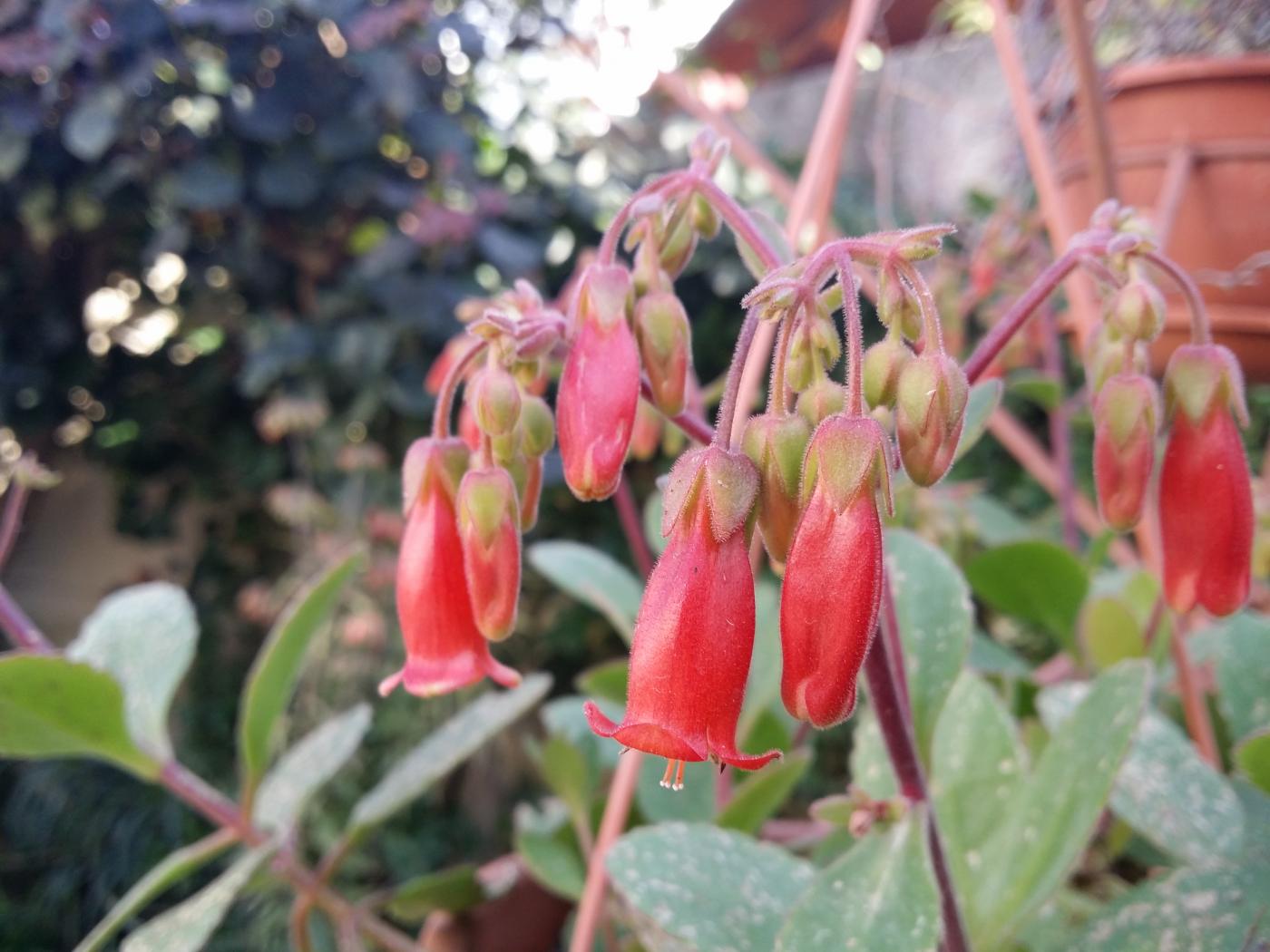
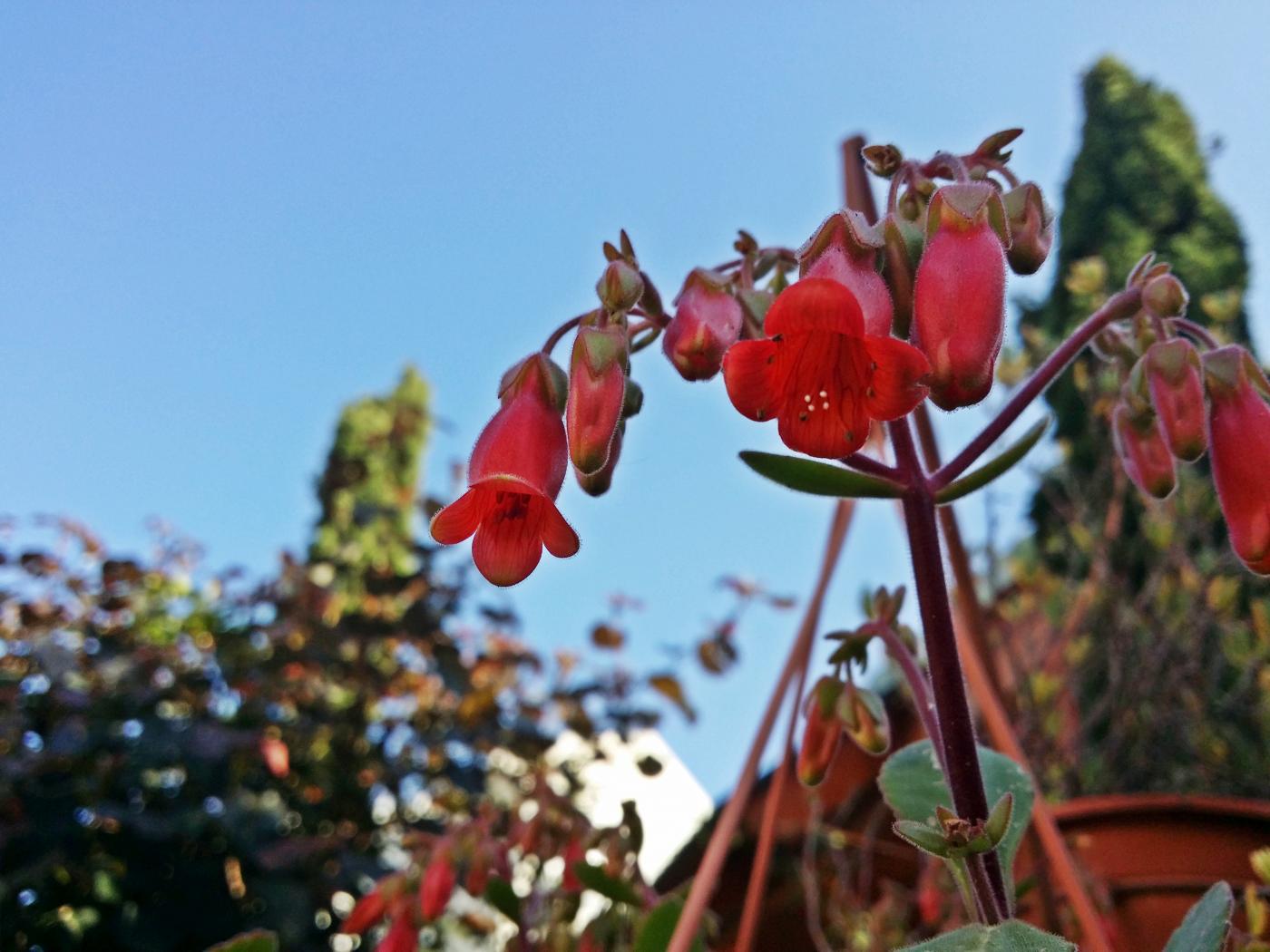
K. peltigera: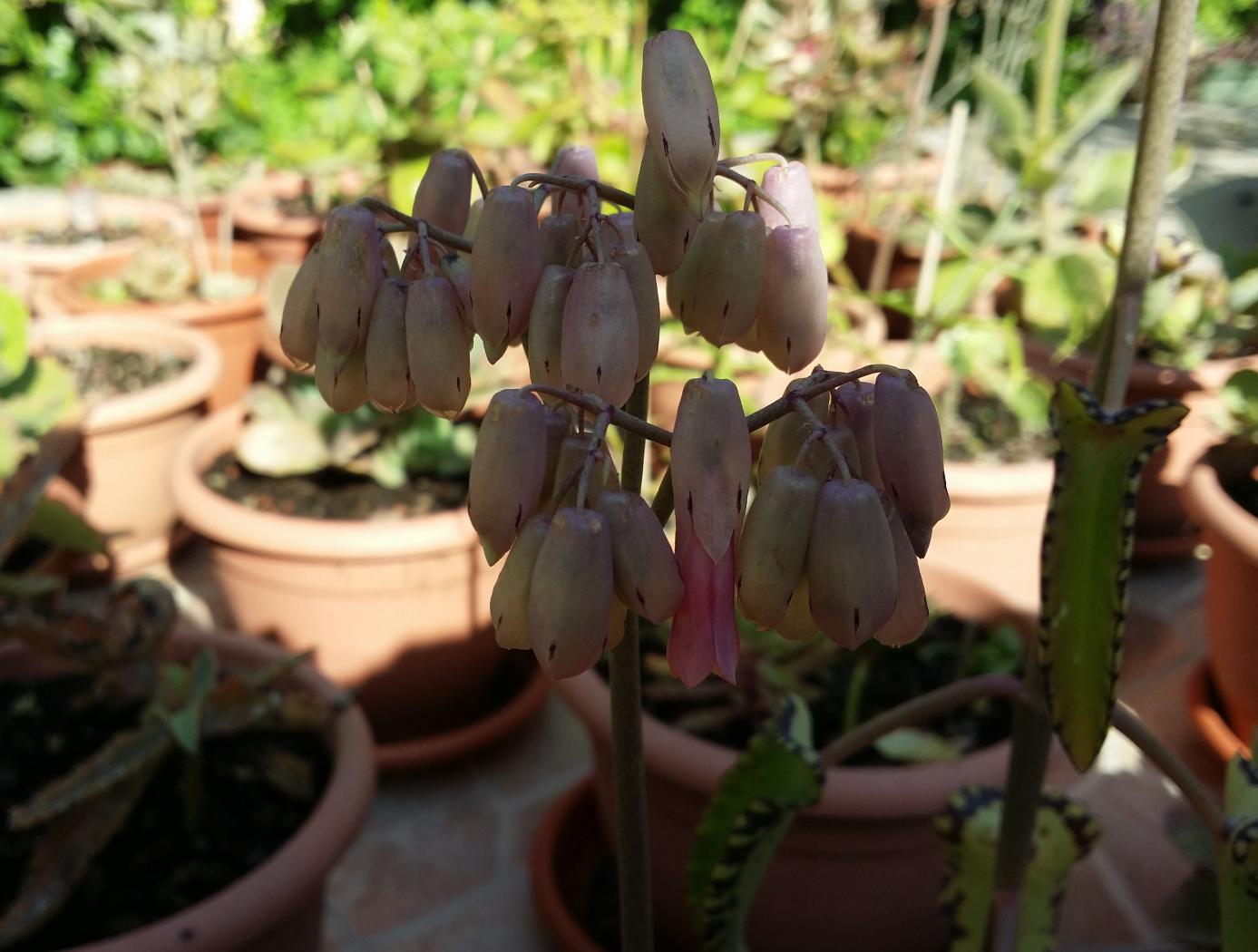
K. laciniata, possibly 'African Queen'?: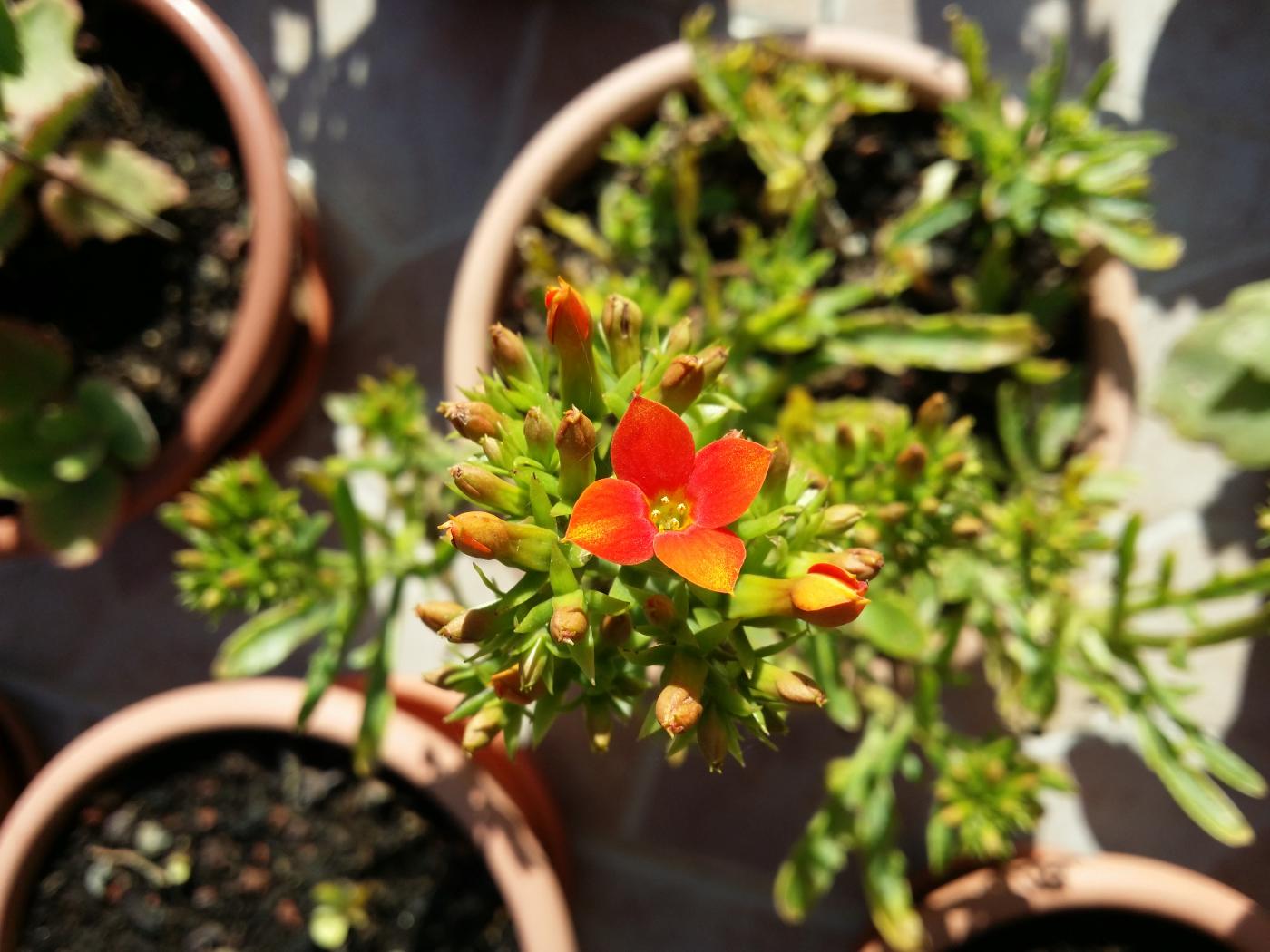
K. × houghtonii (daigremontiana x delagoensis) 'Jaws Of Life':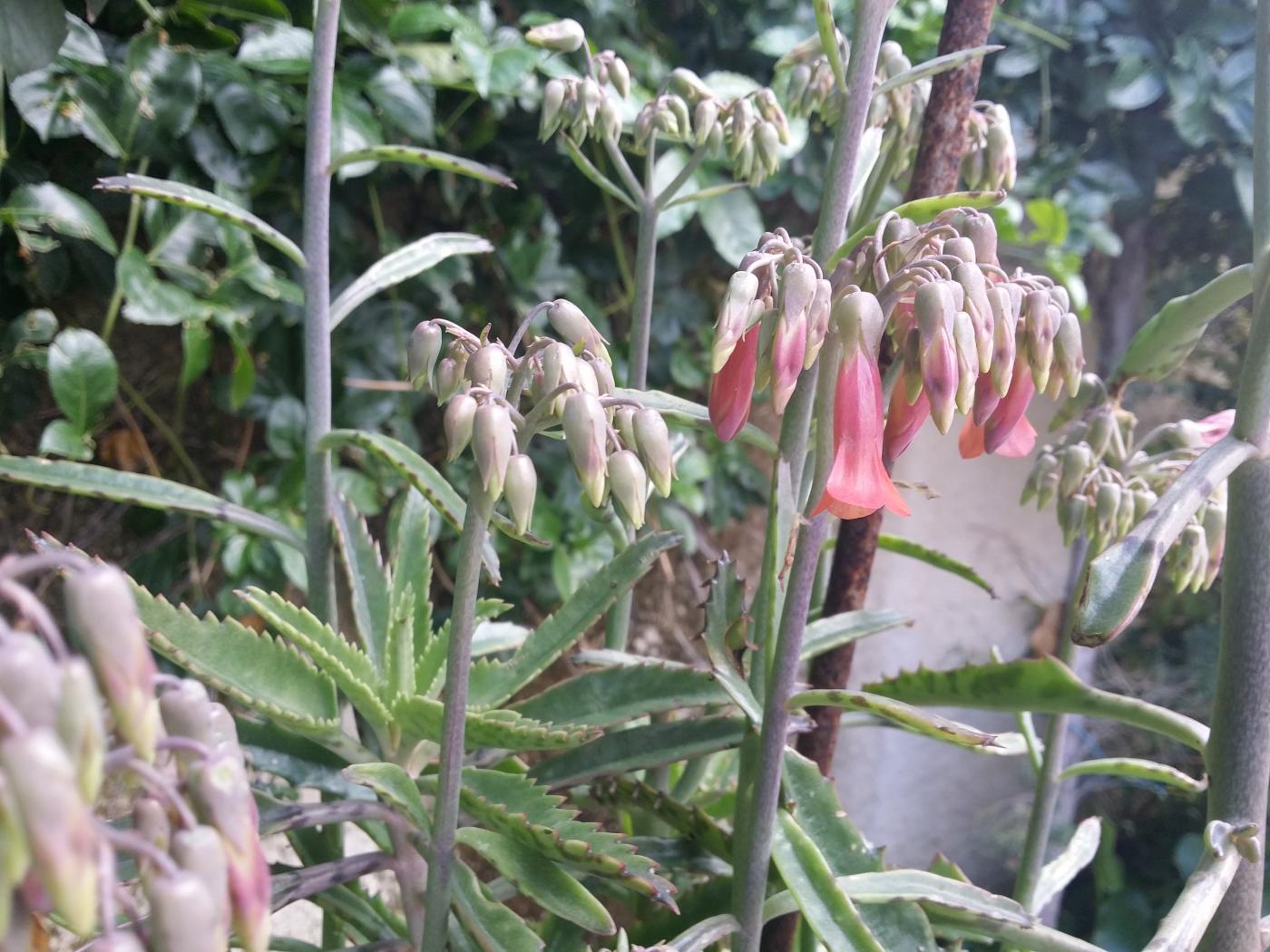
The tiny flowers of the regular K. humilis: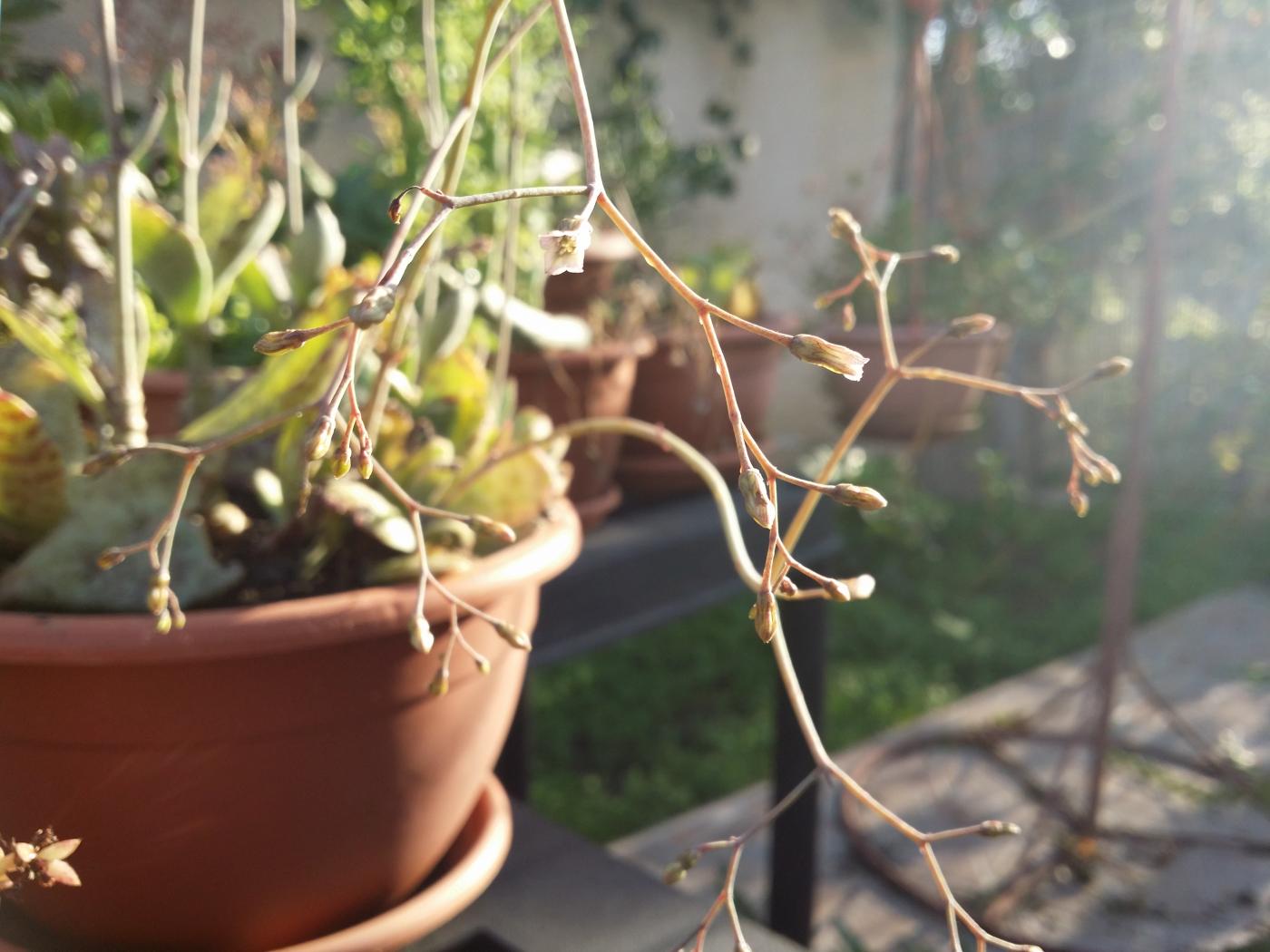
Marginated K. blossfeldiana: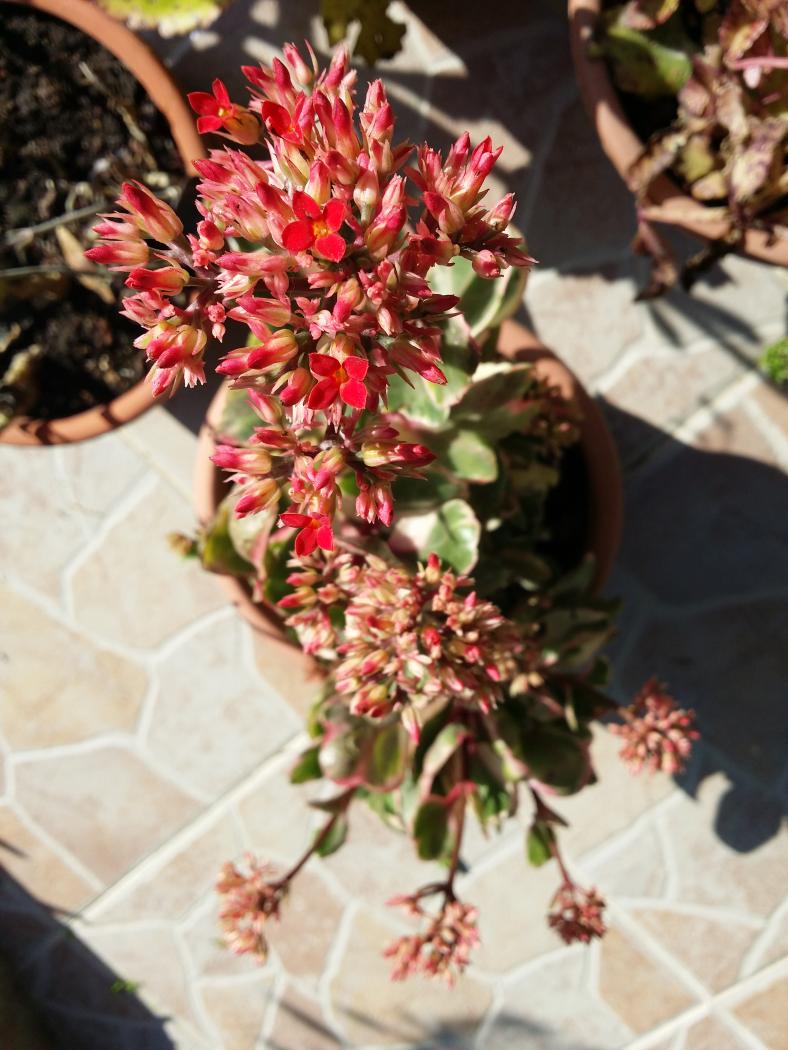
One of two clones of wide-leaf K. beauverdii (with some hail damage):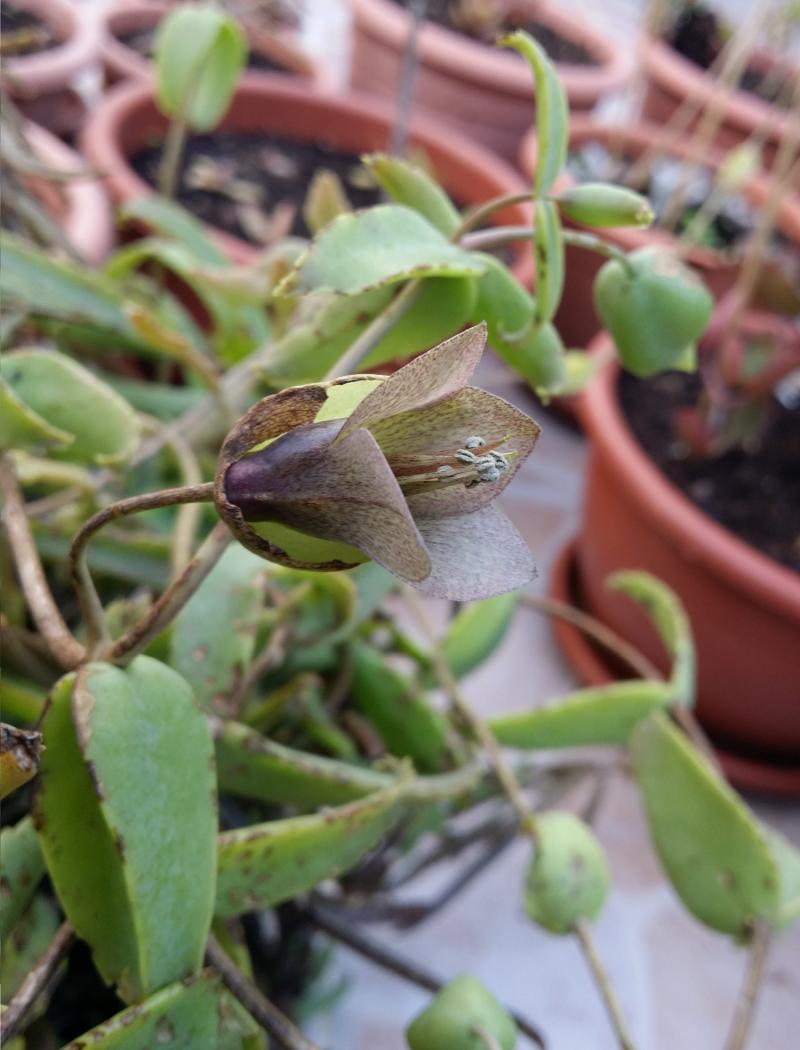
Offline
#69 2015-01-30 10:46:03
- Ronen
- Member
- Registered: 2014-03-25
- Posts: 49
Re: Kalanchoe and others in my collection
From the past week I just uploaded 14 photos, so I guess I shouldn't post all at once... First seven today:
K. x kewensis should flower soon: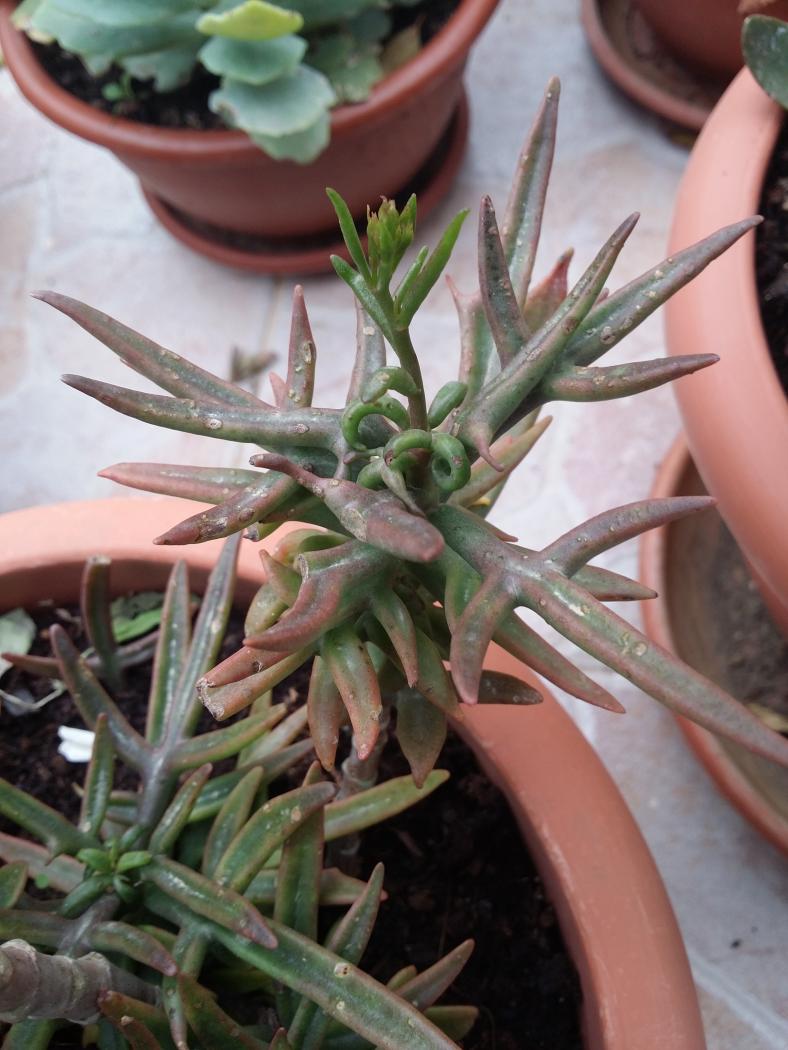
K. rebmannii, again: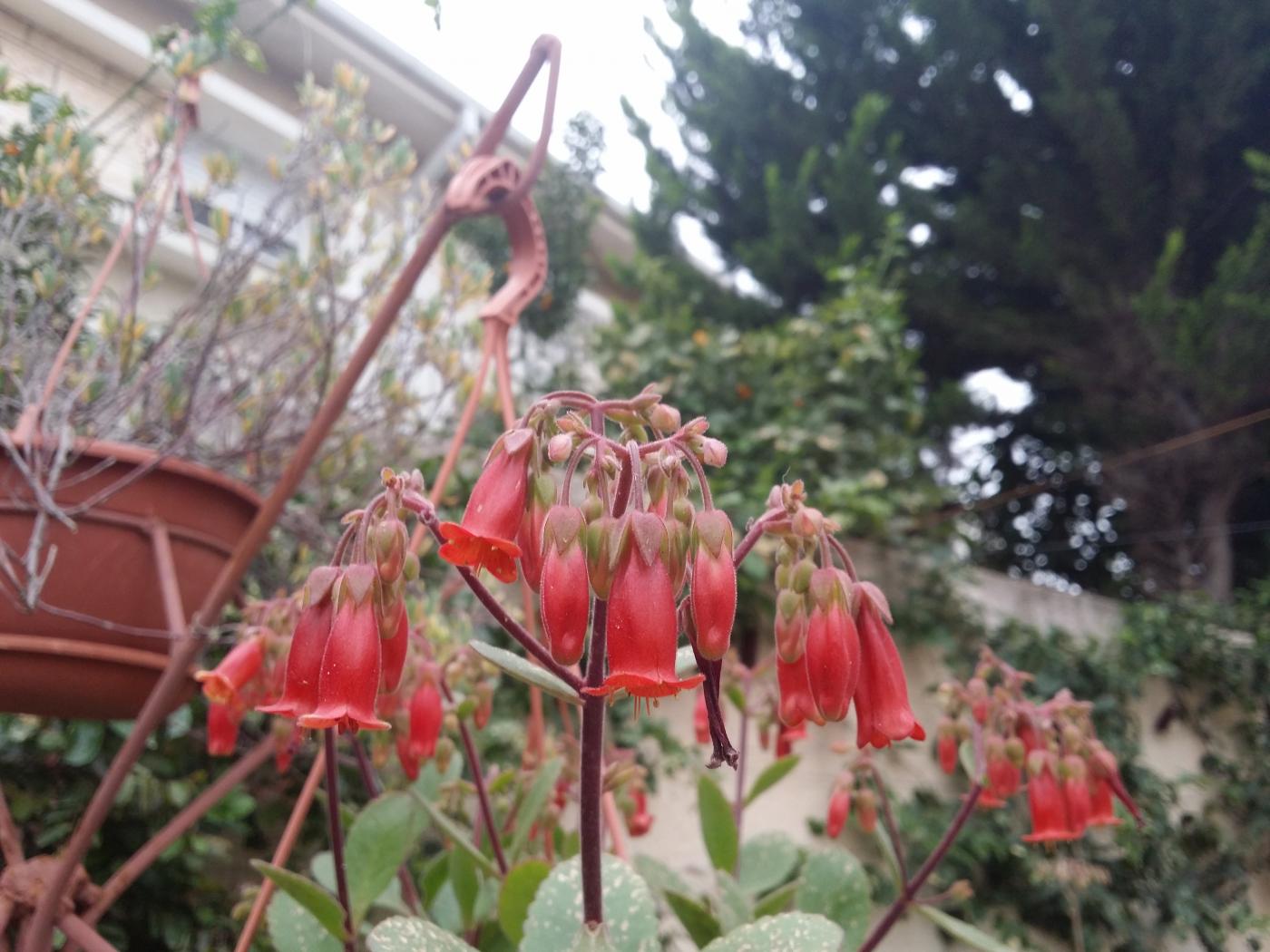
First open flowers for the Kenyan prittwitzii: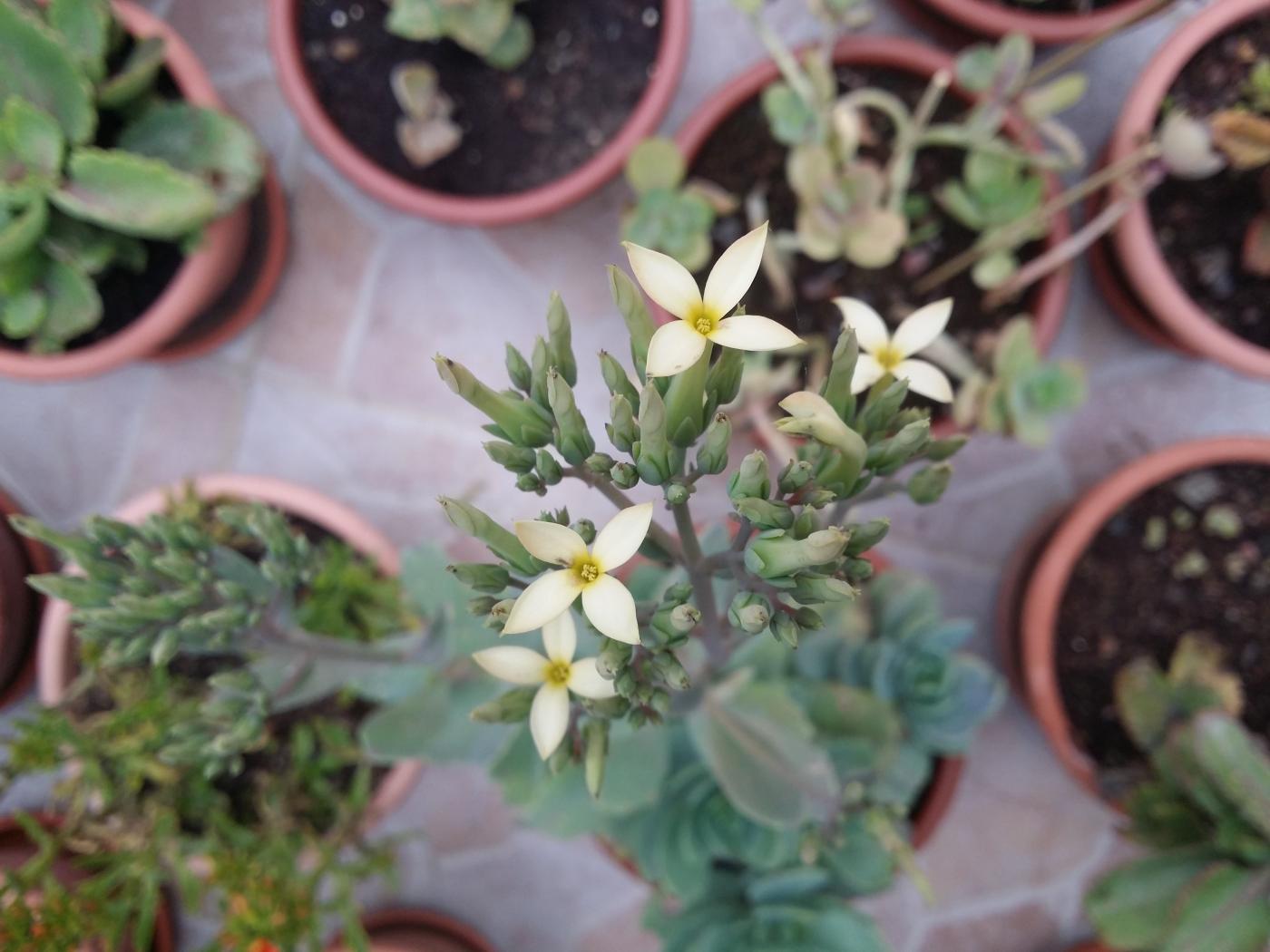
K. peltigera, again (different branch):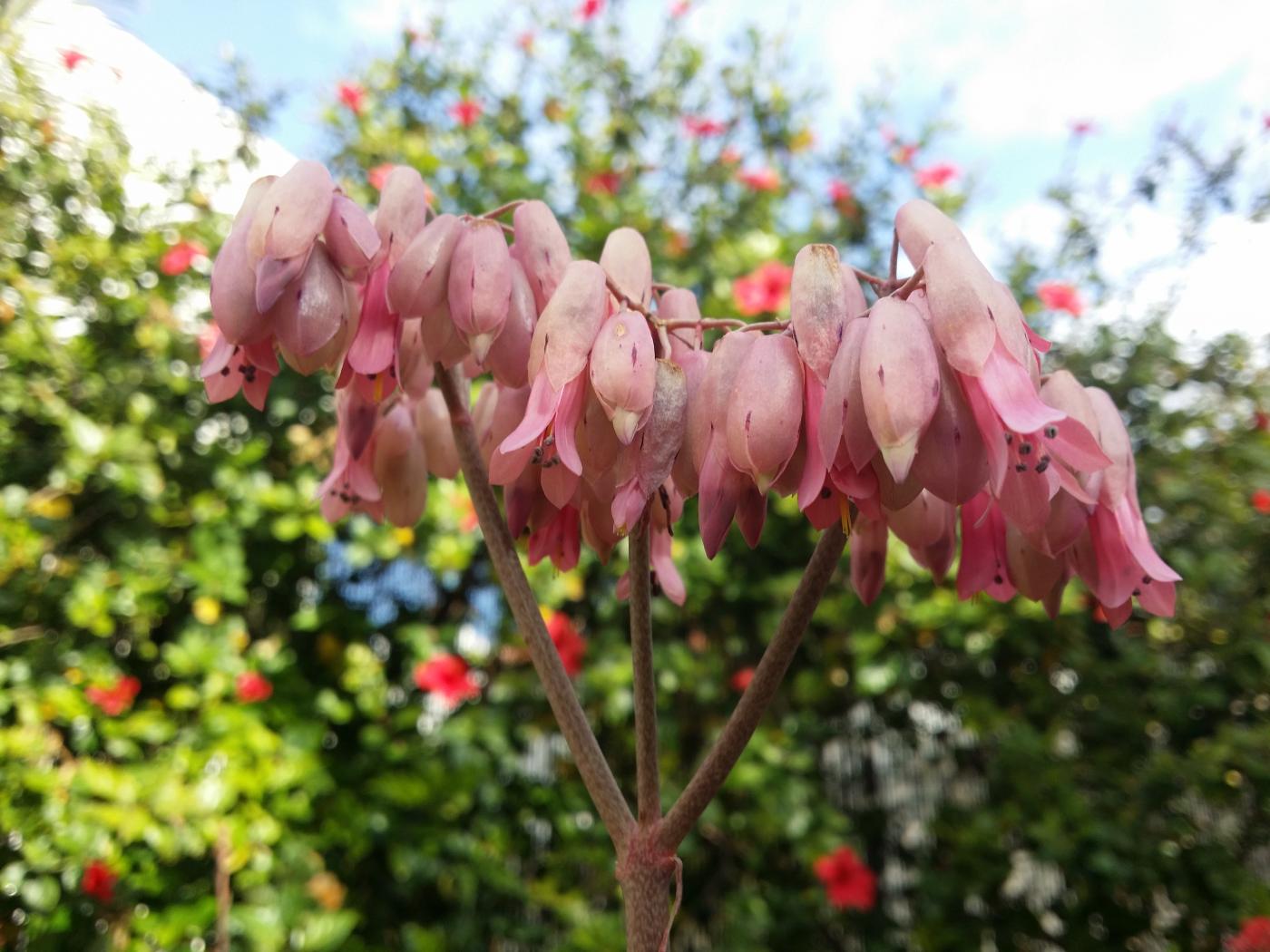
My most robust clone of K. miniata (out of four forms), sadly some parts of the inflorescence are very damaged by hail: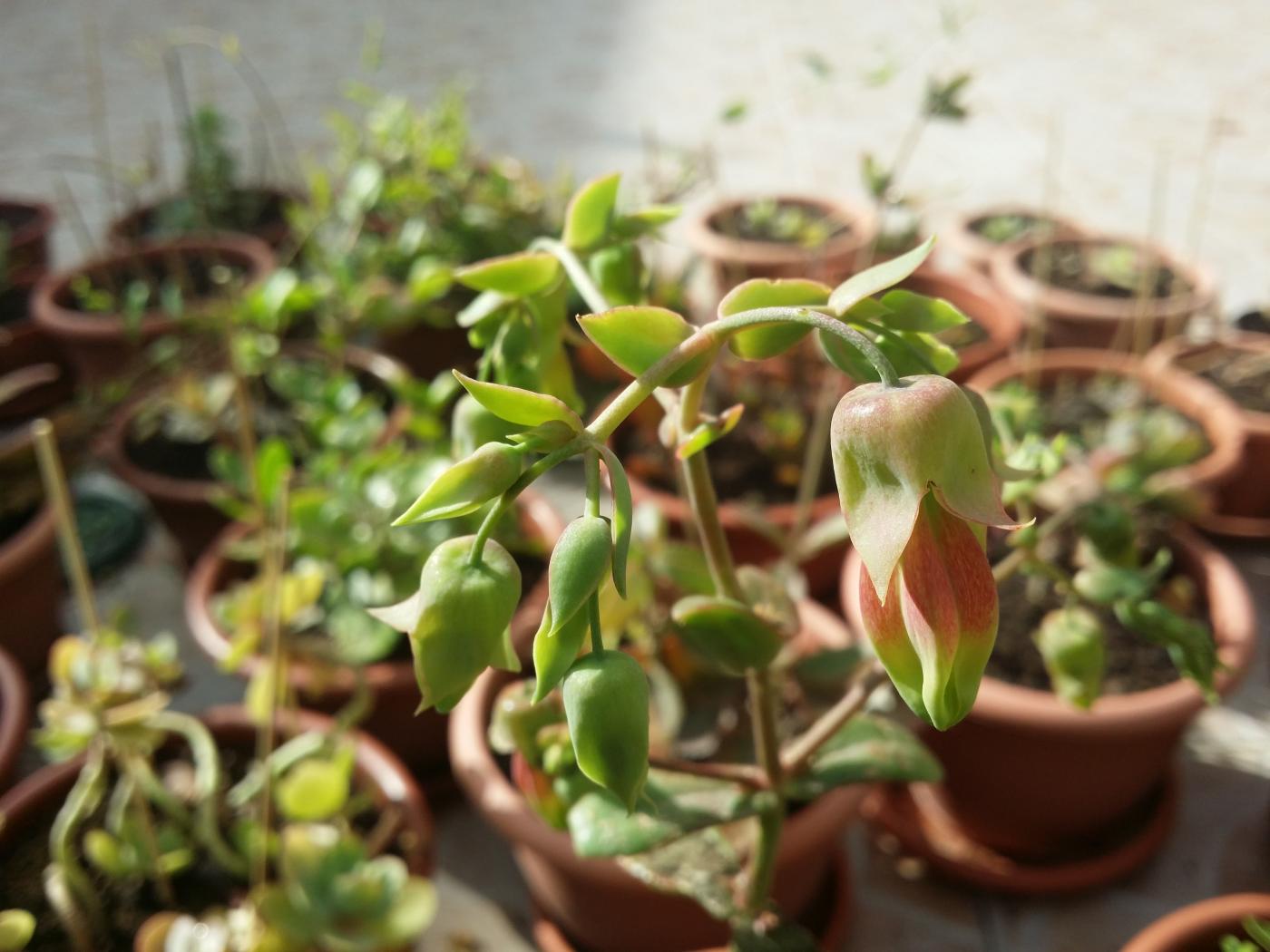
K. lateritia "var zimbabwensis":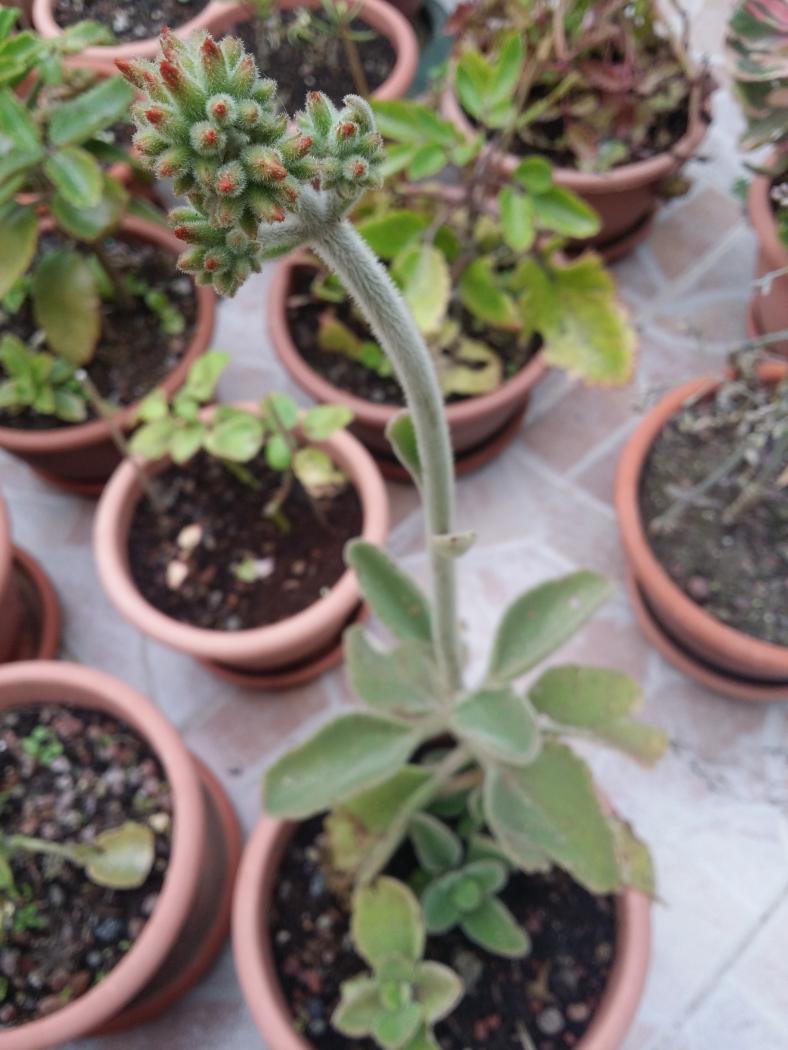
K. laciniata, possibly 'African Queen':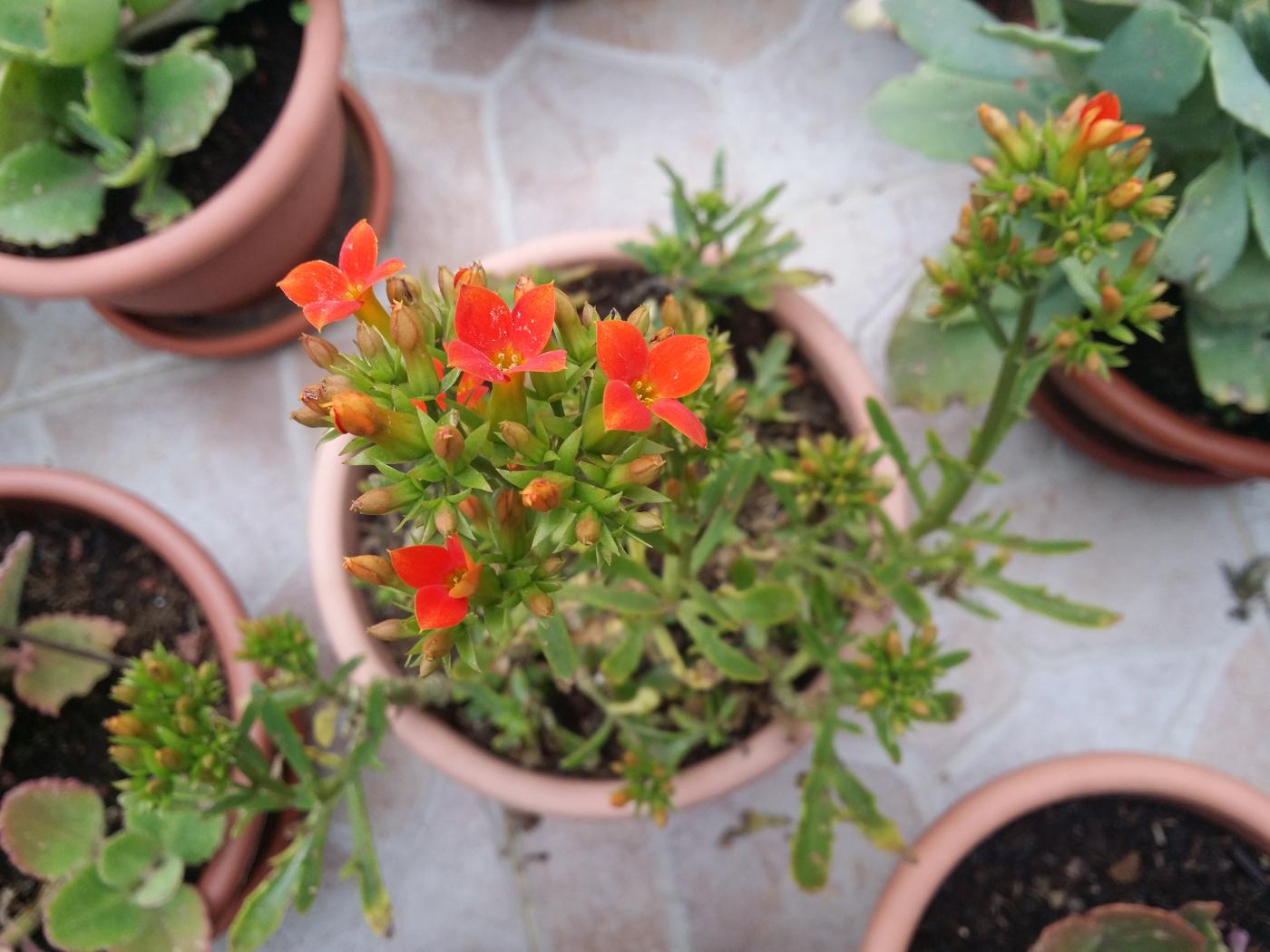
Offline
#70 2015-01-30 13:51:36
- Tom
- Member

- Registered: 2011-09-08
- Posts: 1,722
Re: Kalanchoe and others in my collection
One of two clones of wide-leaf K. beauverdii (with some hail damage)
But a nice corolla. ![]()
Offline
#71 2015-01-31 10:45:57
- Ronen
- Member
- Registered: 2014-03-25
- Posts: 49
Re: Kalanchoe and others in my collection
Ronen wrote:One of two clones of wide-leaf K. beauverdii (with some hail damage)
But a nice corolla.
Thanks! That hail happened when the corolla was still tiny, so I could see how it slowly develops "inside" the calyx. It was also exposed to light much earlier, and probably this is why this flower was the first to open.
As promised, more photos (8 instead of 7):
Buds of Richaud's possible second clone of inaurata or miniata, that Tom also has: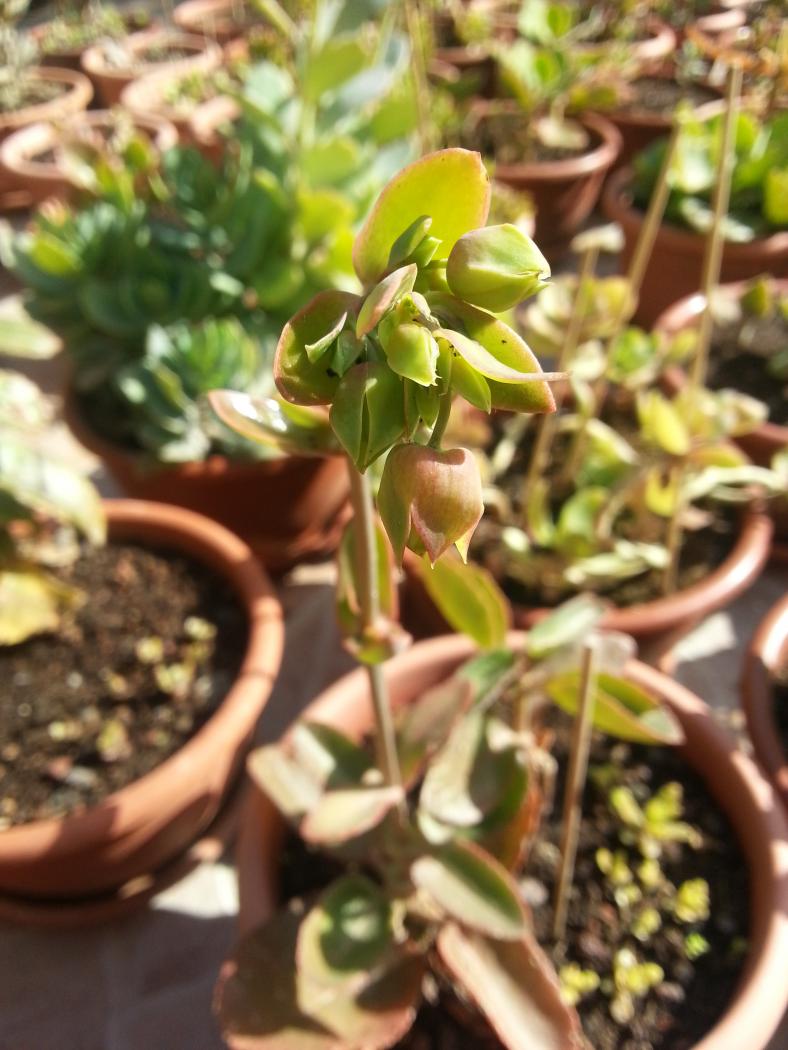
Buds of Richaud's peltigera-like miniata (in leaf shape and coloration):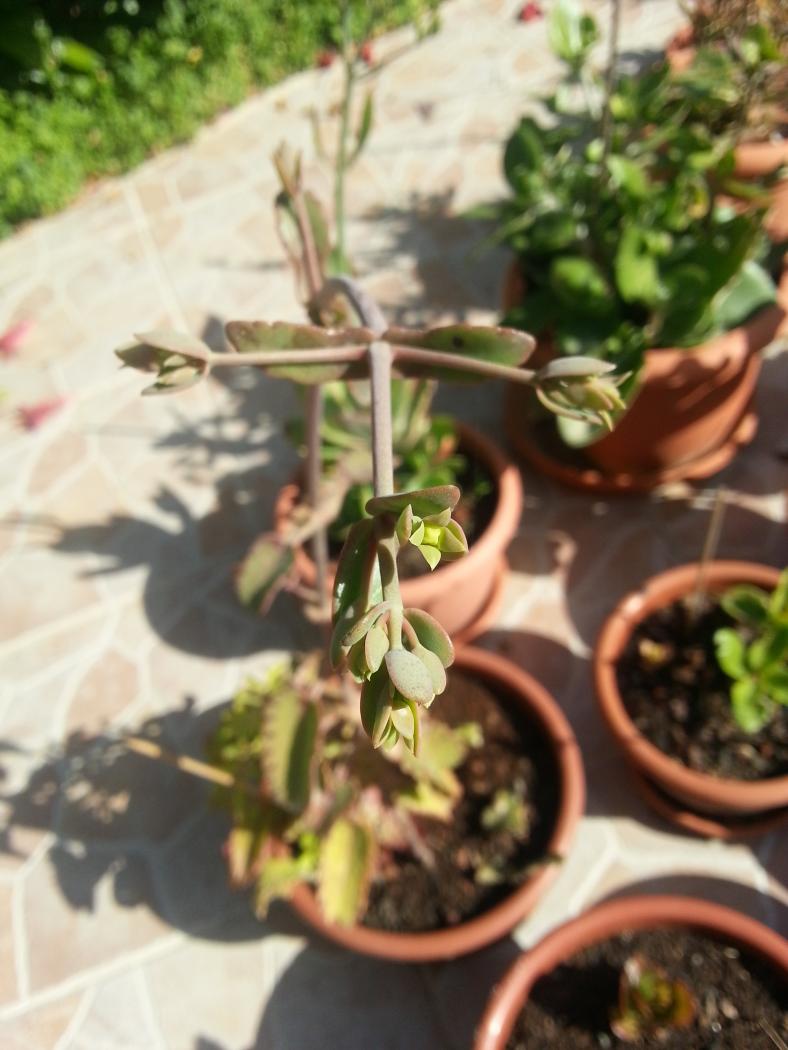
Just noticed that jongmansii is also about to flower: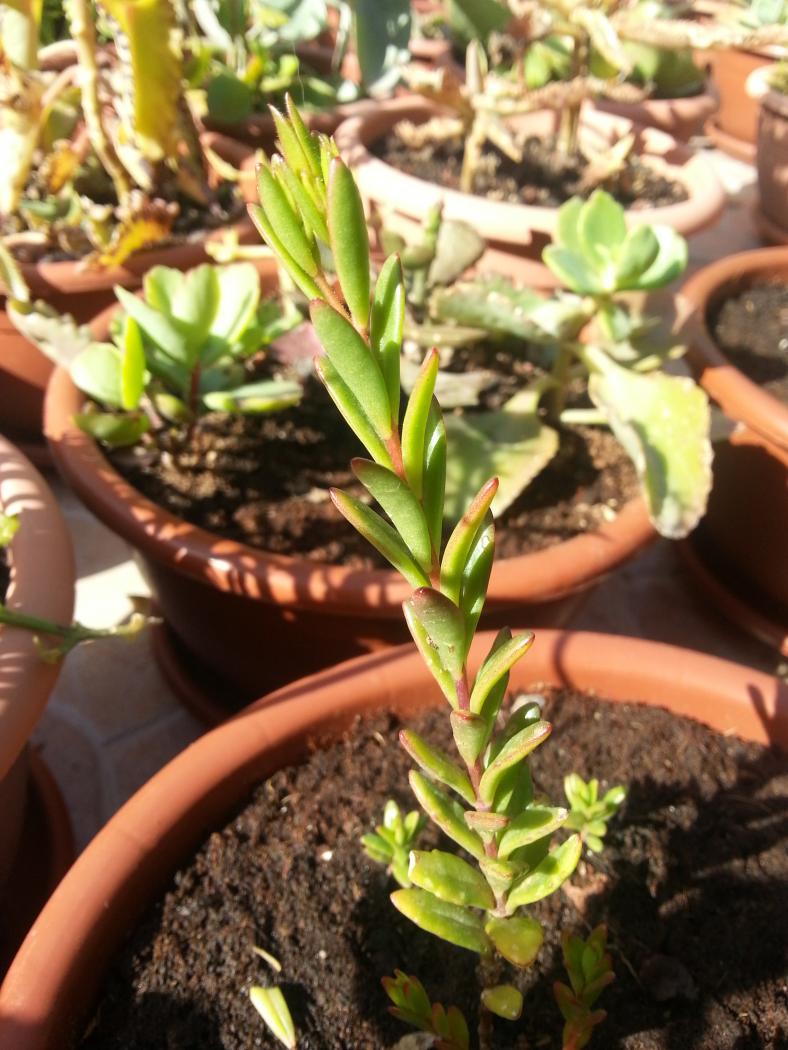
Buds on porphyrocalyx x uniflora from Japan: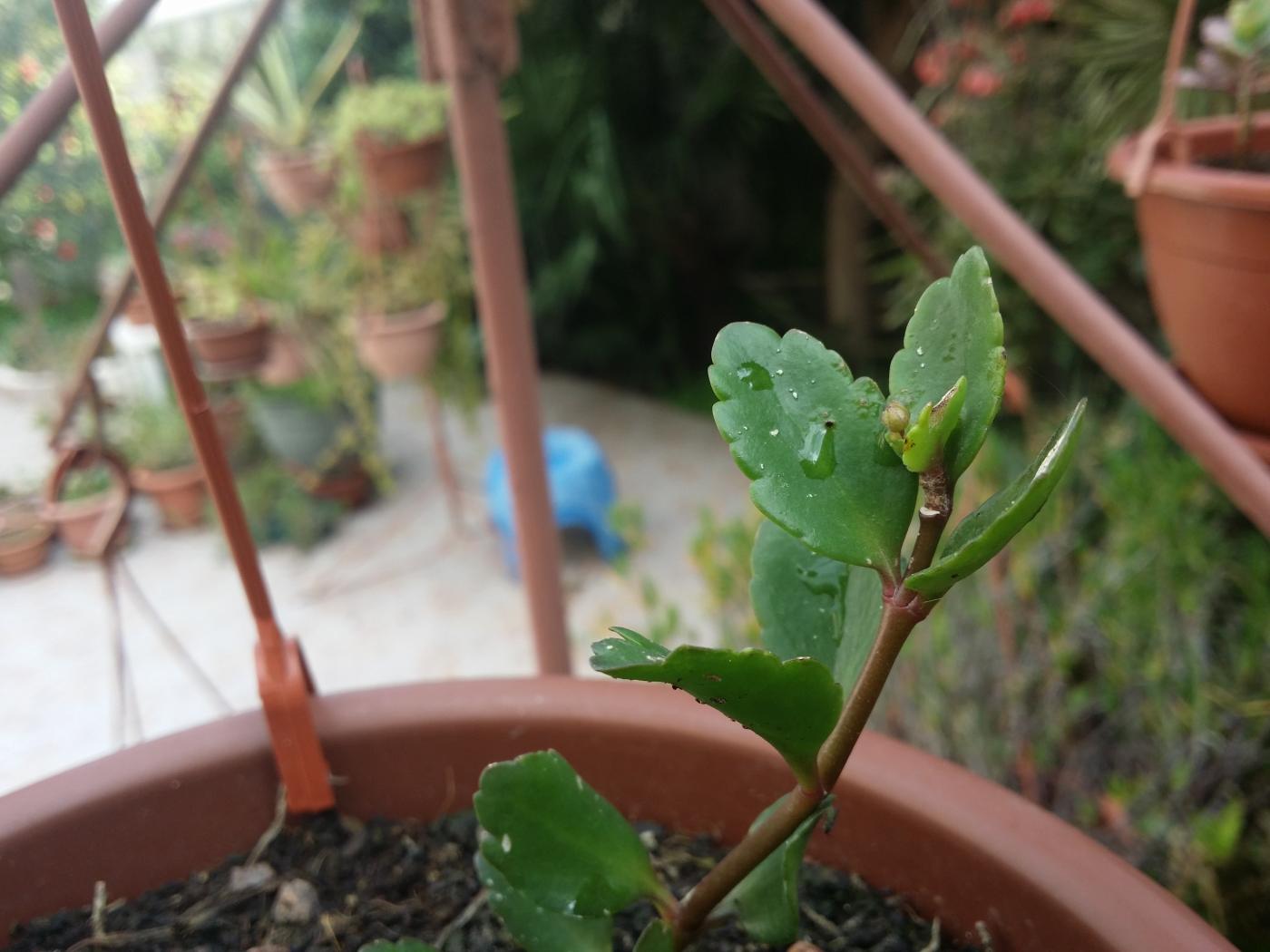
'Jaws of Life', again (it is mostly in shade, in full sun the corolla color is dark red):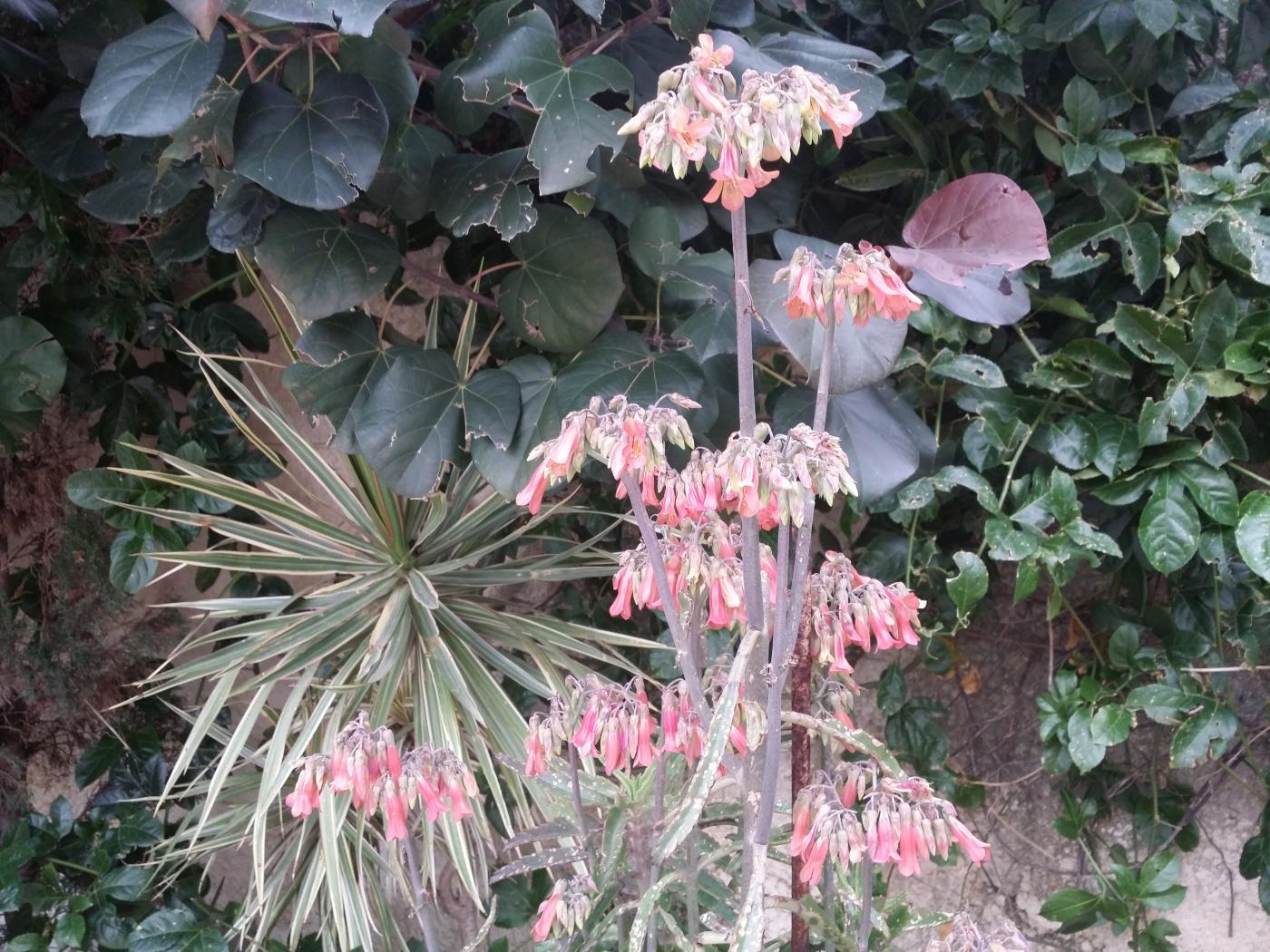
K. humilis "figuereidoi":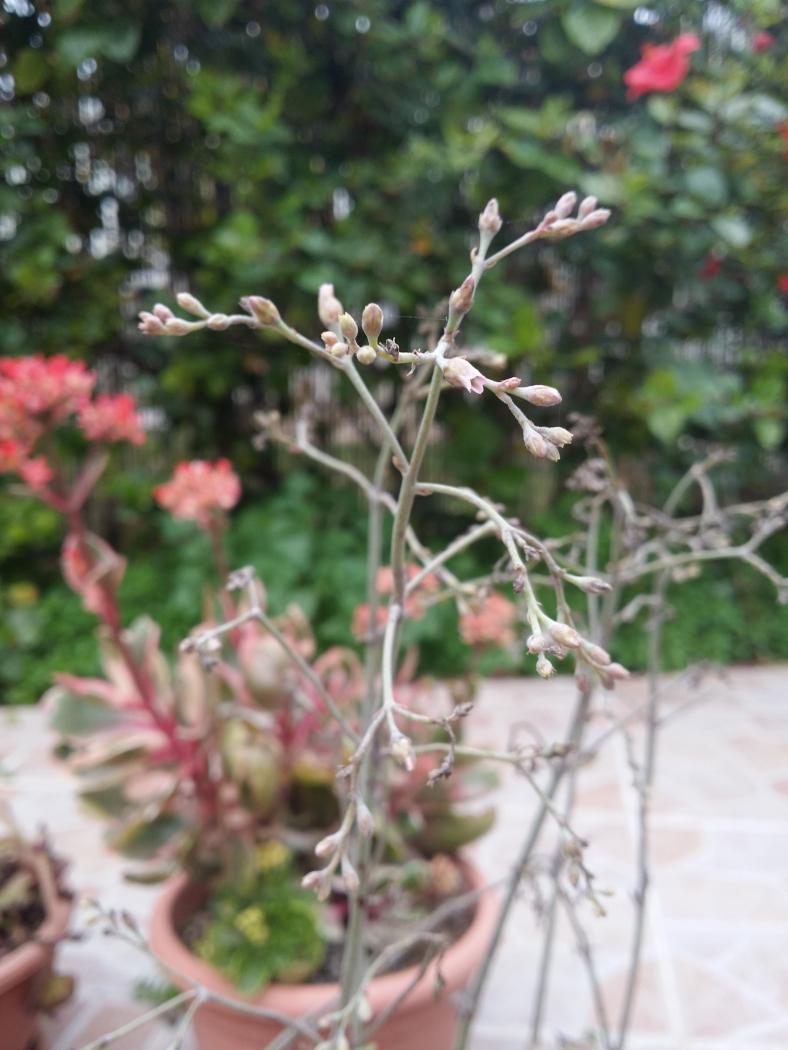
An example of hail damage on daigremontiana: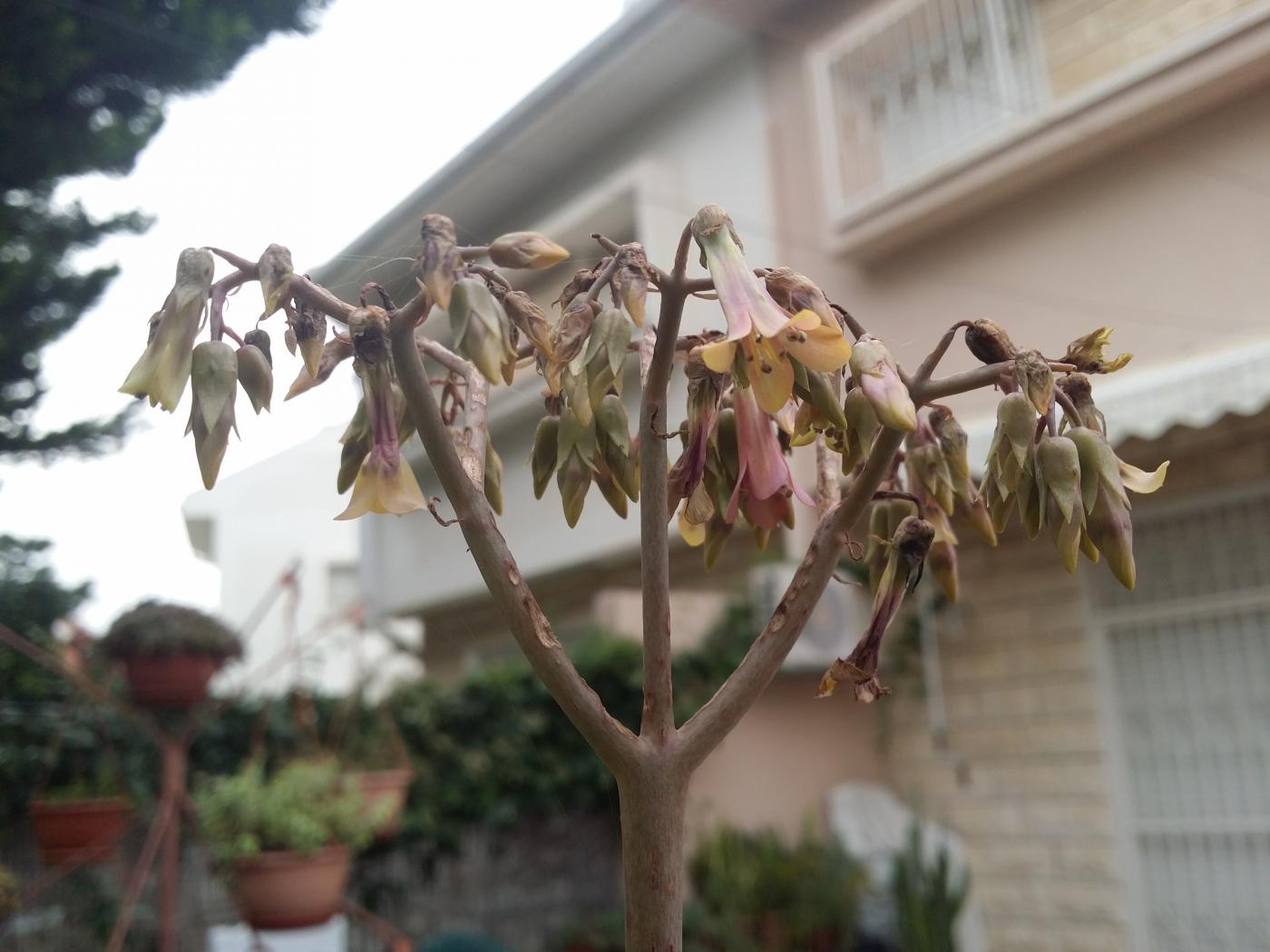
Flowers of my crenata (hairless, dark yellow flowered), with some hail damage, too: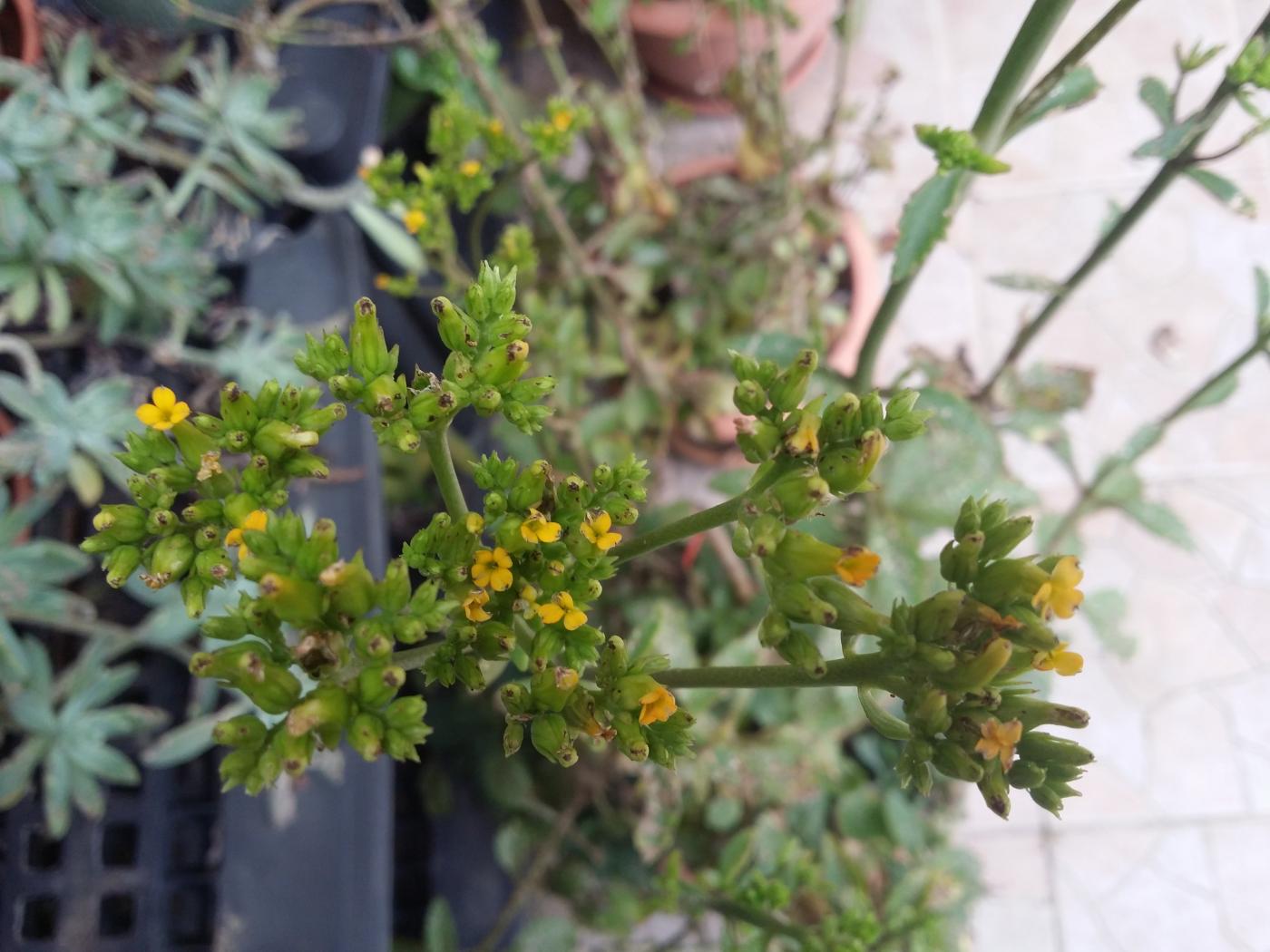
Offline
#72 2015-02-02 16:33:09
- margrit
- Administrator
- Registered: 2007-09-03
- Posts: 5,388
Re: Kalanchoe and others in my collection
Many thanks for updating, Ronen. Hopefully the "hail-season" has come to its end ....
Offline
#73 2015-02-18 15:05:22
- Ronen
- Member
- Registered: 2014-03-25
- Posts: 49
Re: Kalanchoe and others in my collection
Unfortunately last week was very stormy (with hail and sand storms), but I moved everything again. It is still hard to find a good time to take new photos due to visibility, but I'm going to post some anyway. About half are from before the last storm and the rest is more up to date. I won't post these all at once...
Two more photos of one of my wide-leaf K. beauverdii clones: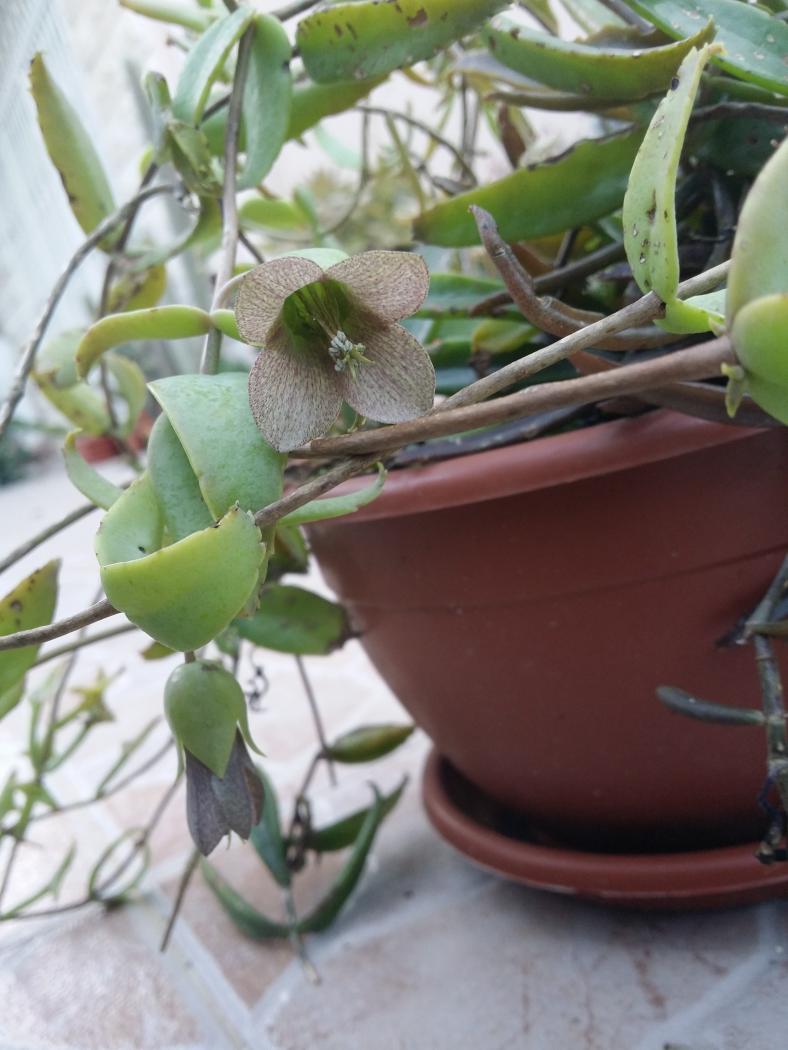
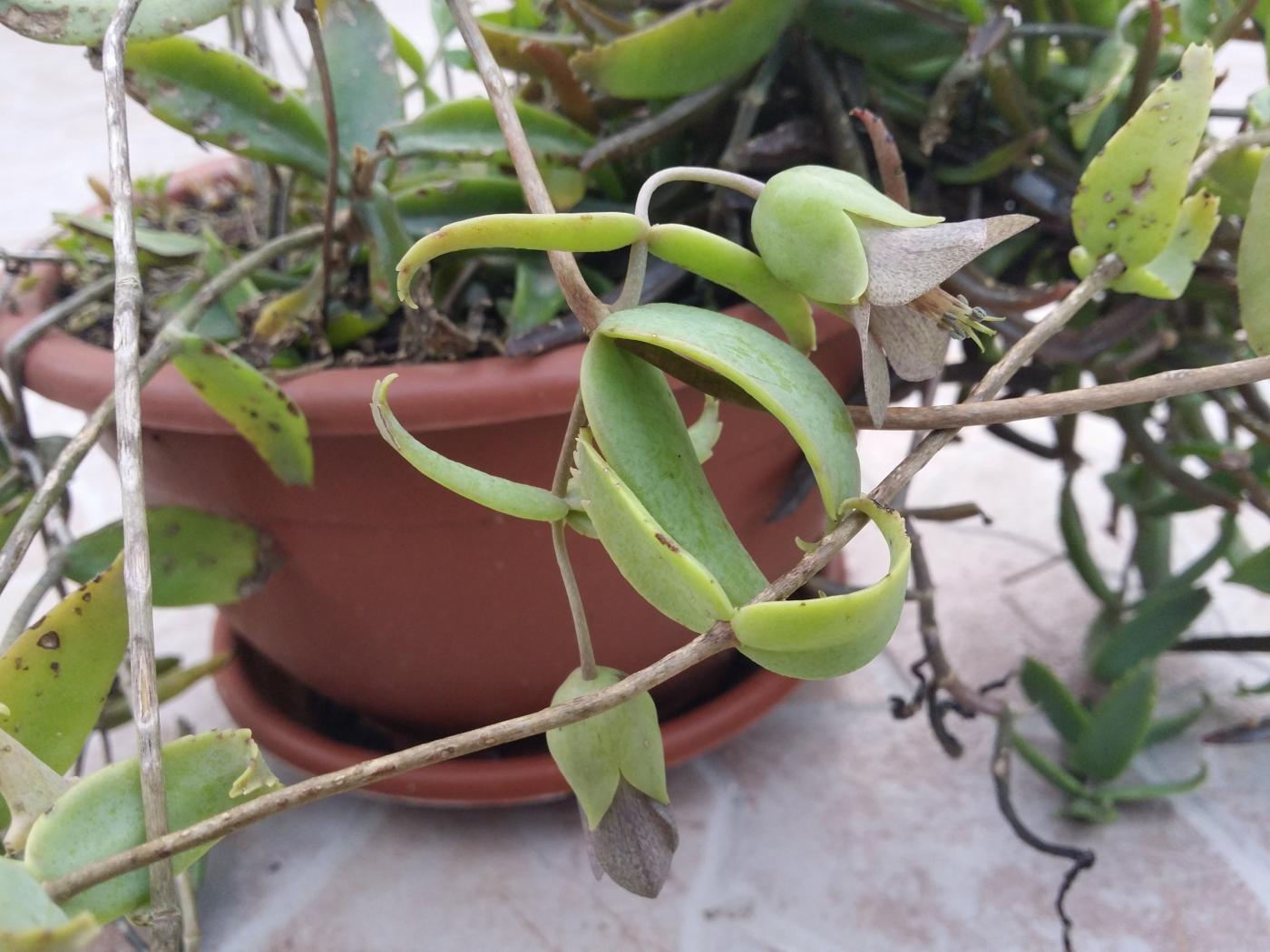
K. laciniata, possibly 'African Queen'?: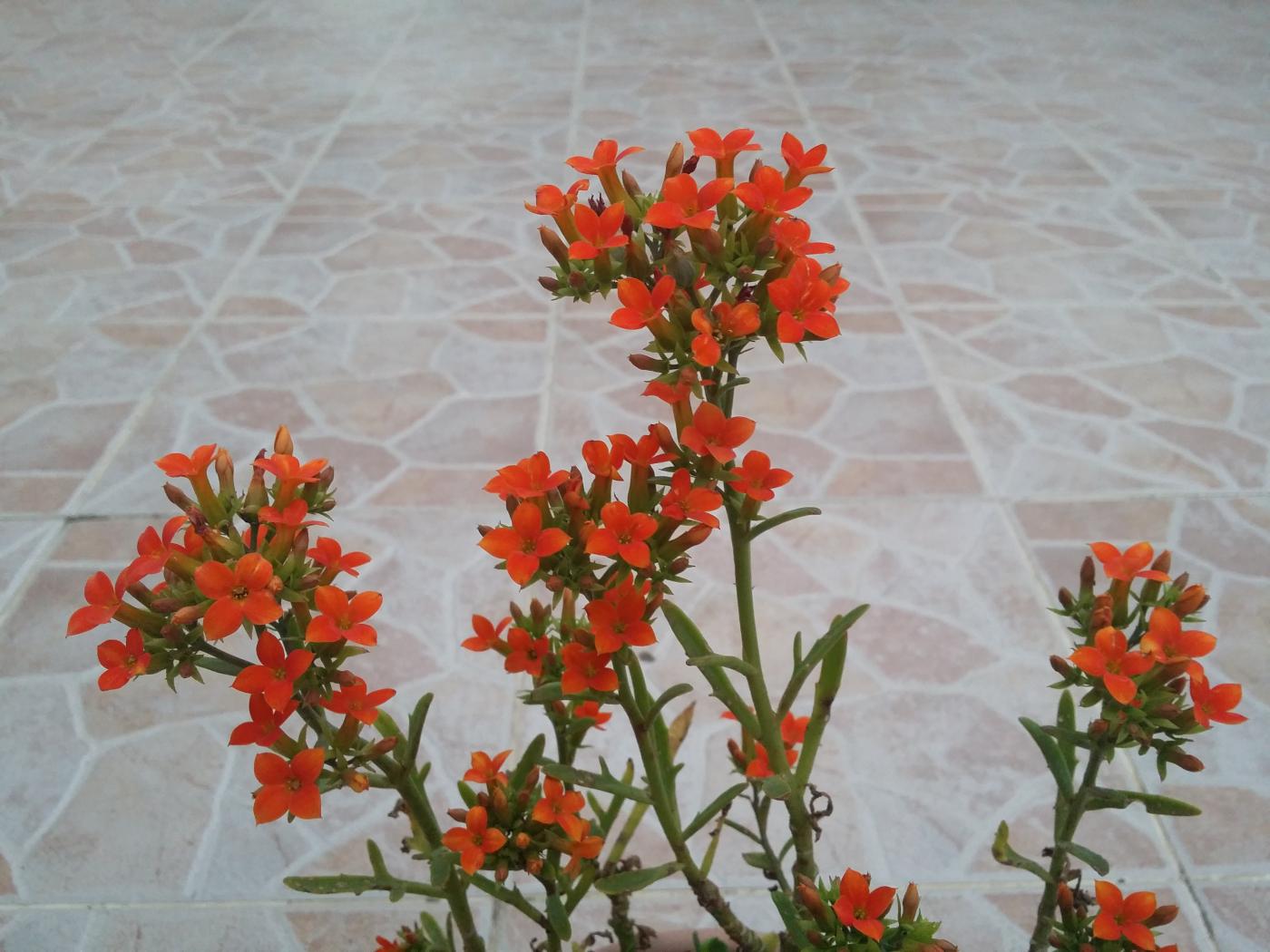
First flowers of K. lateritia "var zimbabwensis":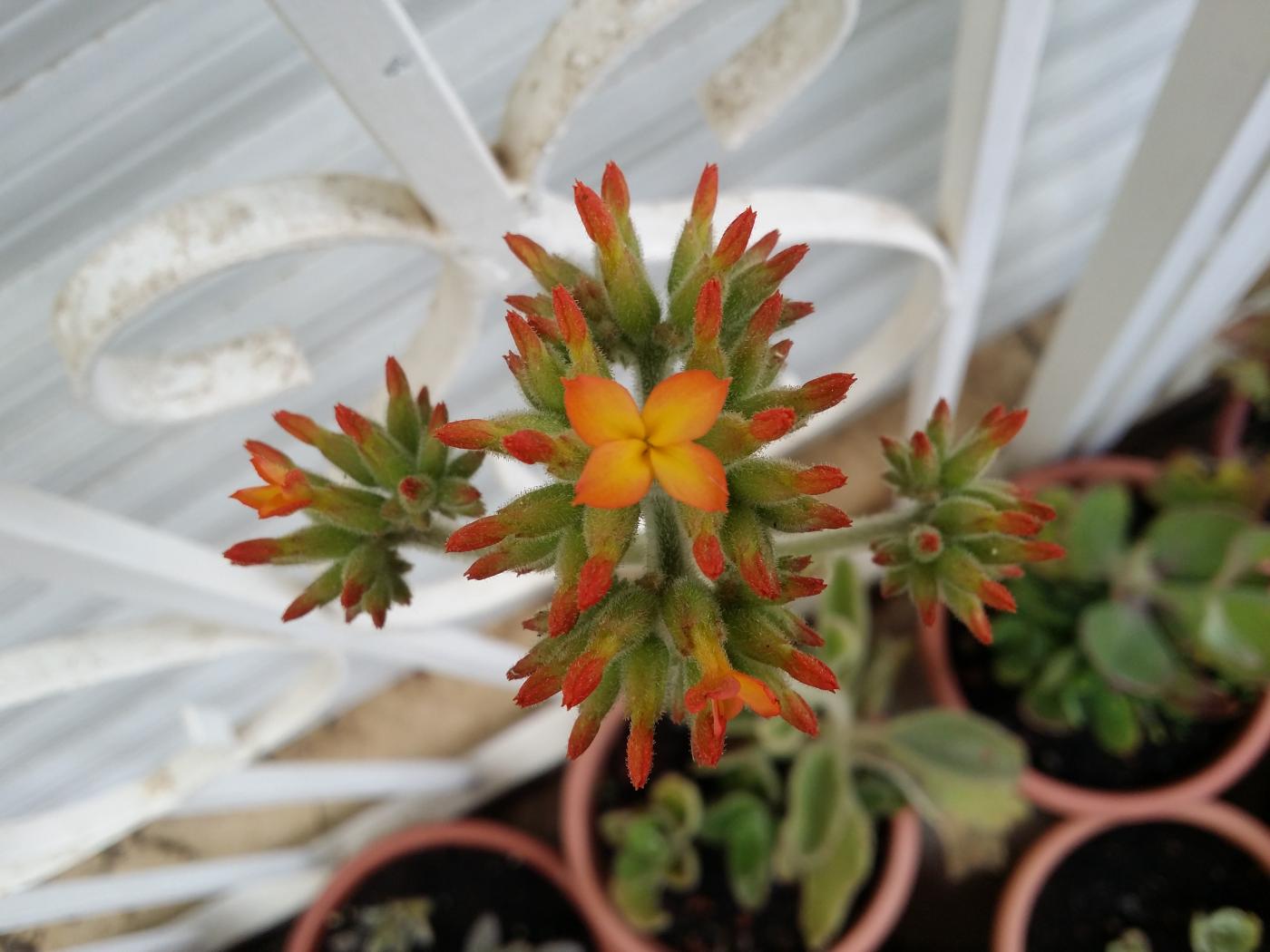
First open flower of my robust K. miniata: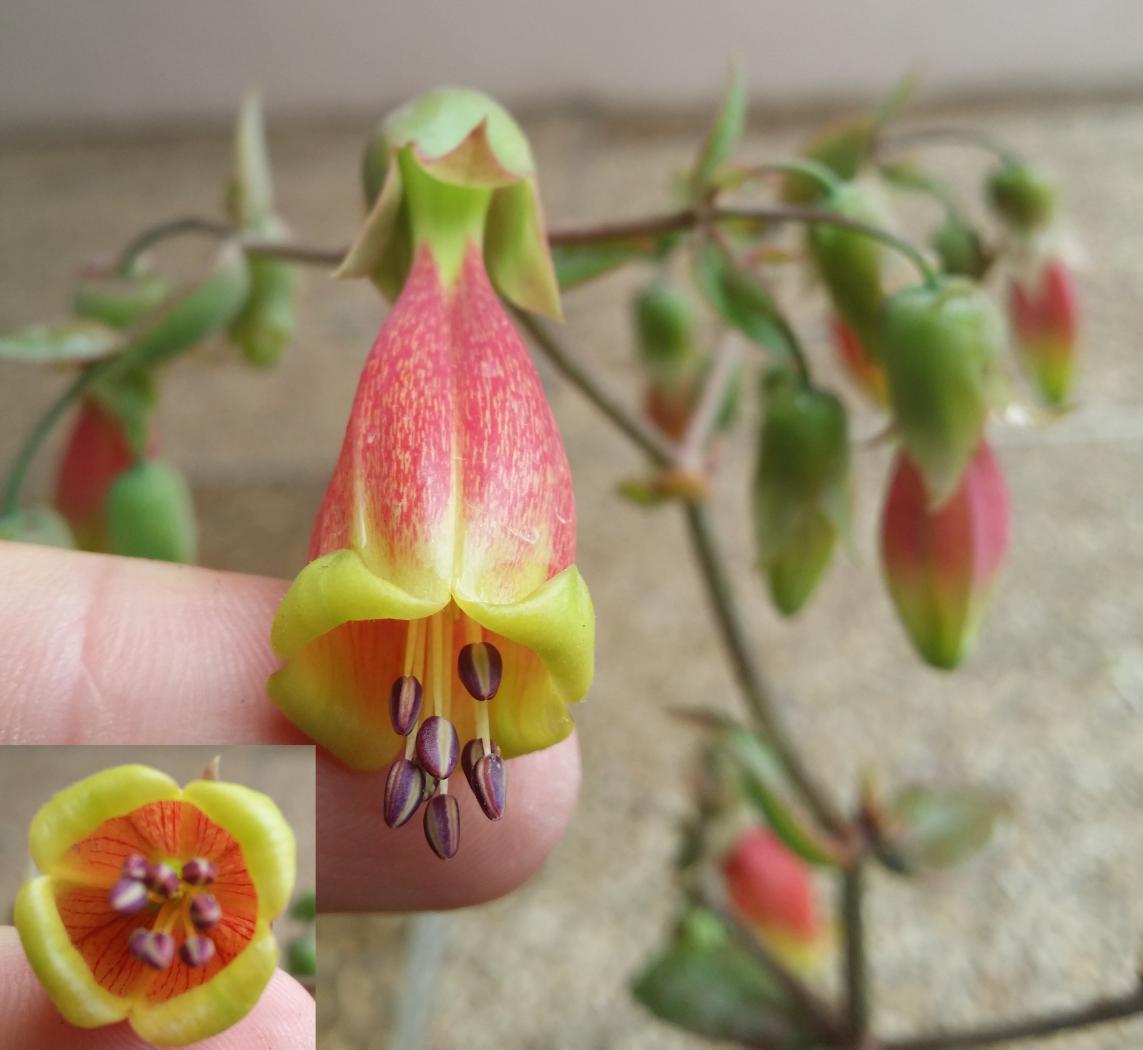
Kenyan prittwitzii: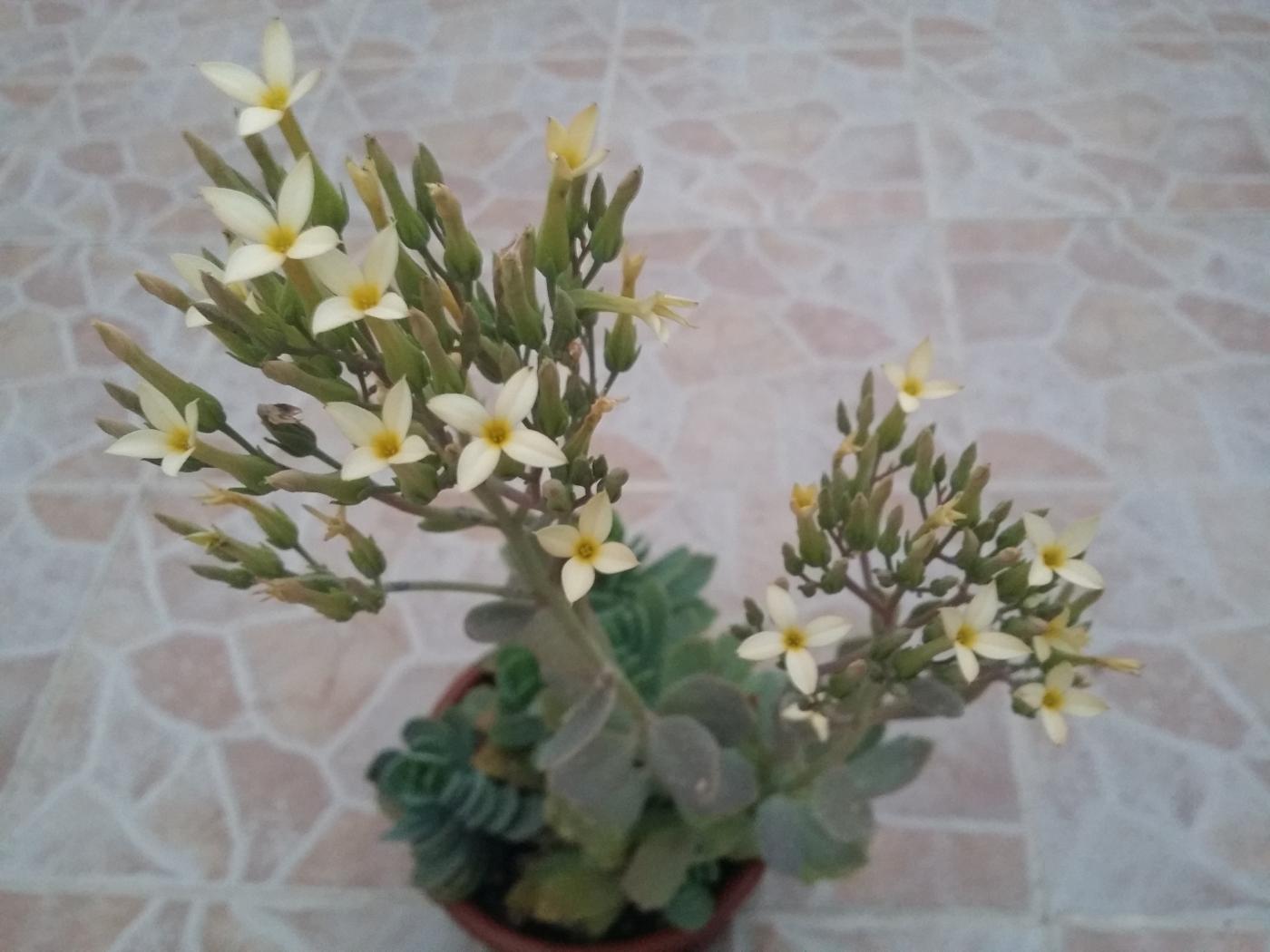
First open flower of the second clone of prittwitzii with entire leaves: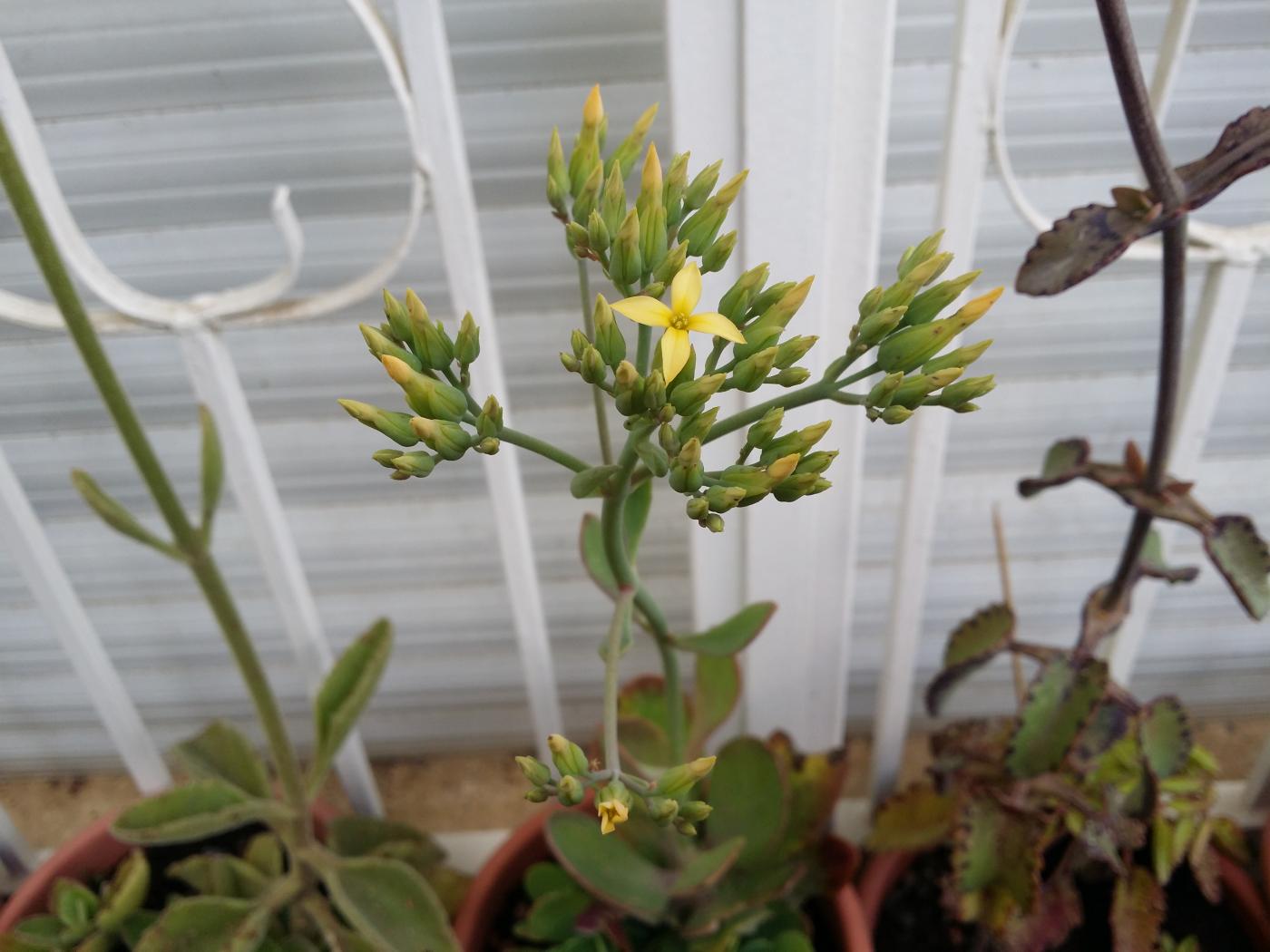
Flowers of the regular clone of K. rosei ssp rosei (these flowers developed after many abnormal hail-damaged buds fell off):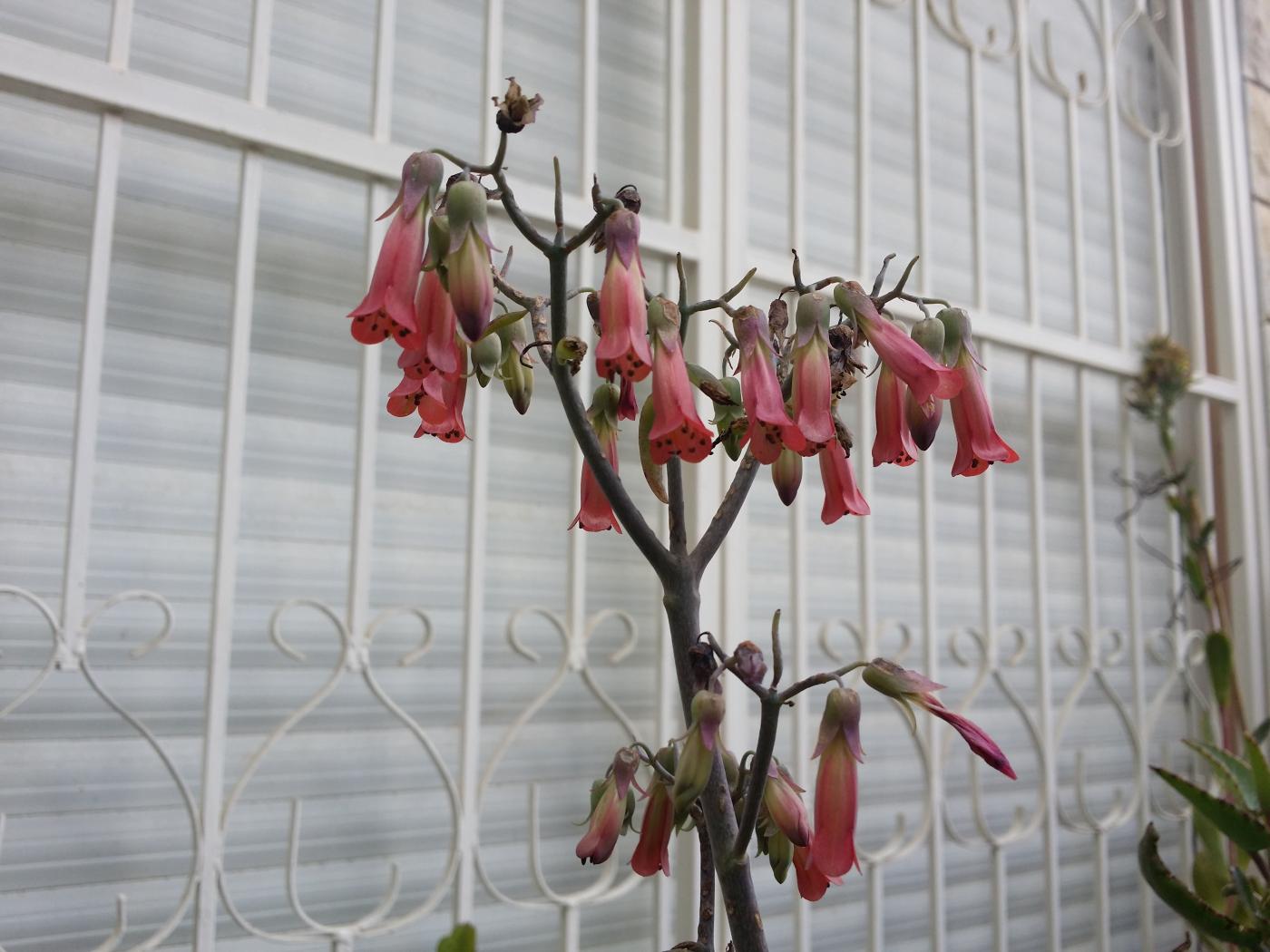
Offline
#74 2015-02-19 11:23:16
- Tom
- Member

- Registered: 2011-09-08
- Posts: 1,722
Re: Kalanchoe and others in my collection
First open flower of my robust K. miniata
What a lovely corolla ! ![]()
Offline
#75 2015-02-19 21:10:19
- margrit
- Administrator
- Registered: 2007-09-03
- Posts: 5,388
Re: Kalanchoe and others in my collection
Ronen, in the description for prittwitzii the anthers are said to have an apical gland - can you see this on your plants ?
Offline